#Janeway taking Tom out of prison
Explore tagged Tumblr posts
Text
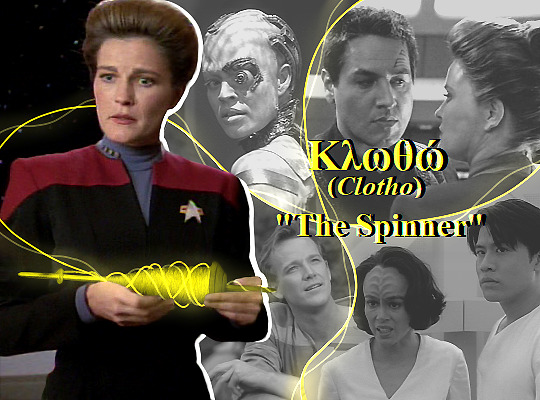
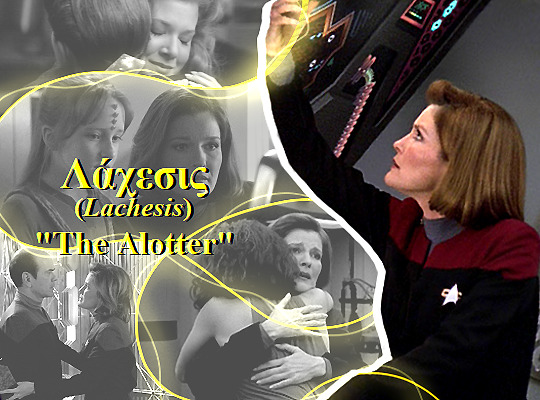
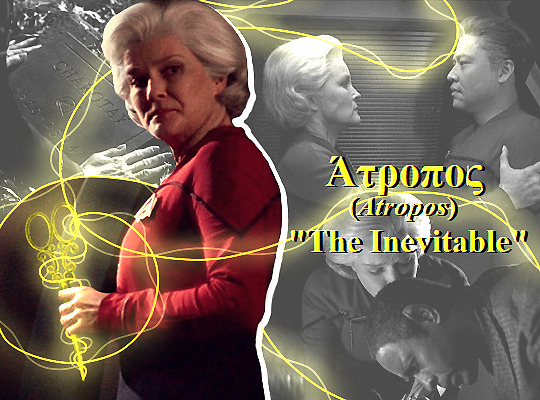
Kathryn Janeway - "The Fates"
The Moirai of Greek myth. The youngest, Clotho - the spinner who controlled life, choosing when a person was born and weaving their thread of existence. The middle one, Lachesis - the allotter who measured out the length of this thread and decided a person's destiny. And the eldest, Atropos - she who was inevitable that ended a mortal's life, cutting the thread and choosing the manner of their death.
#Star Trek#Voy#Kathryn Janeway#art#star trek voyager#voyager#I haven't made a fandom edit in a VERY long time#but I couldn't get this concept out of my head#I tried to include things that sort of worked with each Fate#Janeway taking Tom out of prison#freeing Seven from the collective#and taking on the Maquis after destroying the caretaker#AKA she's deciding how the crew are “born” in their new lives#then the “measuring” and deciding of their destinies as she nurtures and guides them#a mentor to Naomi and as a friend to the Doctor#acting as a sort of mother-figure for B'Elanna and Kes#and then Future! Admiral Janeway as Atropos#deciding how their fate will END#and refusing to allow HER future to happen#because she decided that Tuvok's illness wasn't an acceptable end#nor was the death of Chakotay and Seven#and Harry is right there with her#helping her to make sure that THIS ending won't happen#anyways I'm Obsessed hope this all makes any kind of sense#ALSO making edits with grainy old 90's footage is SO HARD
114 notes
·
View notes
Text
2024 Fic Posted (by me)
Game of Thrones
Deescalation - Daenerys Targaryen/Jorah Mormont, 2,988 words, Explicit
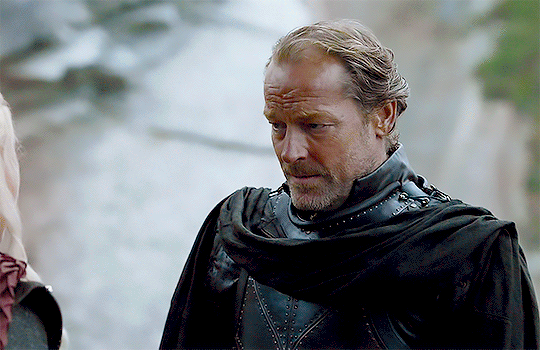
Daenerys is frustrated by her Small Council. Jorah is more than willing to do whatever it takes to make her feel better.
The Lord of the Rings: The Rings of Power
we must take it where it's found (pretty soon it may be costly) - Elendil/Miriel, 3,375 words, Explicit
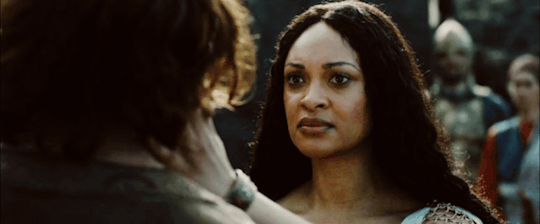
After surviving their trial, Míriel feels emboldened to clarify certain things with Elendil.
won't you put your faith in me (we both know that's what matters) - Elendil/Miriel, 2,437 words, Explicit.

Elendil discovers a scar on his beloved queen. This raises questions which Míriel is reluctant to answer.
Goodbye Goodbye - Elendil/Miriel, 3,553 words, Explicit

“No one is following us,” Isildur urges, completely misreading the reason for his father’s gaze fixated on the horizon, staring in the direction of their former home shrinking from sight as the sun sinks further and further.
Trial and Temptation - Elendil/Miriel, 17,361 words (and counting), 6/15 Chapters Posted, Explicit
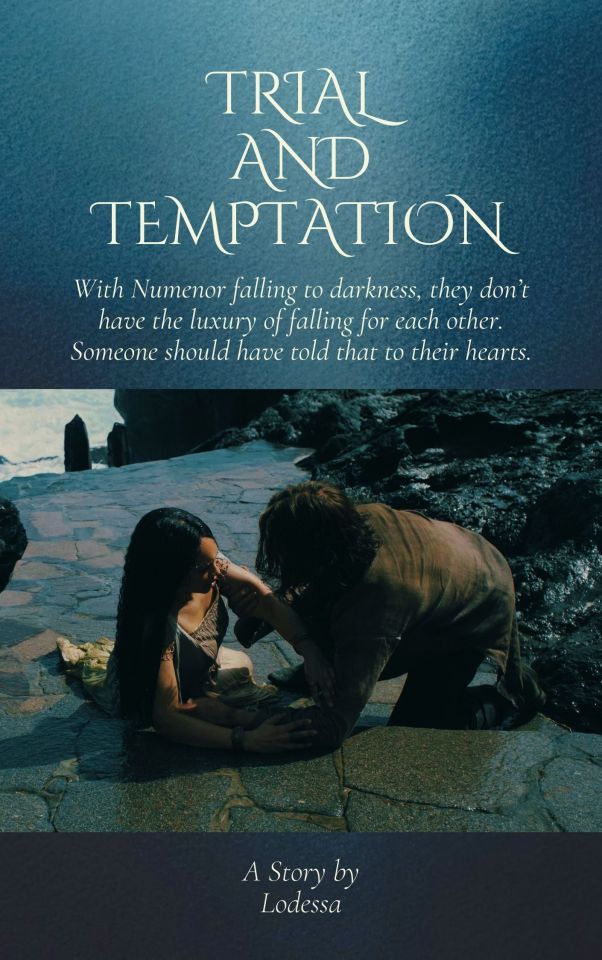
The Sea Trial forces Míriel to make a difficult choice.
hollow / full - Adar/Earien, 4,353 words, Explicit.
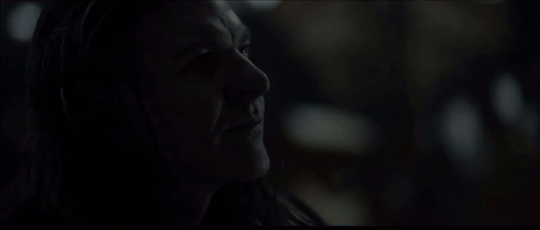
In the last millennium he has come to know his consort’s moods. The simple angle of her chin can tell him more than most could torture out of a prisoner in weeks or years.
Revolution
Five Ways It Came Out That Charlie's Biological Dad Was (Shockingly) Bass Series 3/5 posted
Controlled Detonation - Rachel Matheson & Sebastian Monroe, 1,052 words, General.
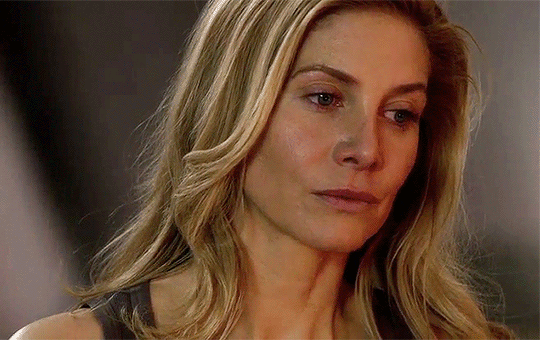
Managing Sebastian requires a certain balance, a kind of backhanded praise that flatters his ego while seeming to resist at the same time.
Family Meeting - Miles/Bass, Sebastian Monroe, Rachel Matheson, Charlie Matheson, Miles Matheson, Connor Bennett, 1,607 words, Teen.
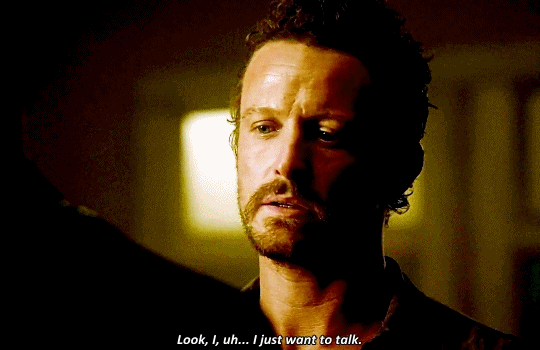
“Family meeting. Not optional,” Rachel announces and Bass finds himself hovering in place, waiting for her to kick him out, remind him that he’s not a Matheson, no matter how much he might want to be.
Trojan Gift Horse - Julia Neville/Tom Neville (references to Rachel Matheson/Sebastian Monroe and Charlie Matheson/Jason Neville), 1,203 words, General.
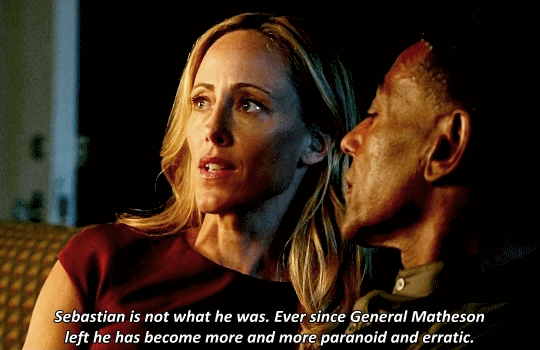
Julia Neville finds a way to turn her son's feelings for "that Matheson girl" into an opportunity.
Star Trek: Prodigy/ Star Trek: Voyager
Respite Renewal - Kathryn Janeway/Chakotay, 2,816 words, Explicit
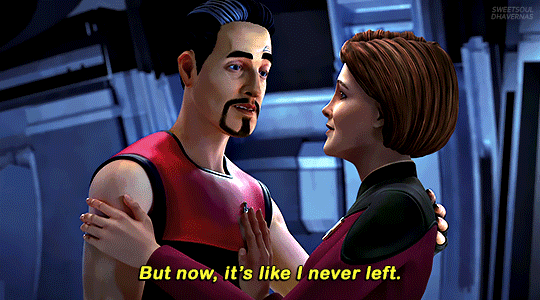
Vice-Admiral Janeway and Captain Chakotay's reunion continues (away from the prying eyes of the children) in the privacy of her quarters aboard the Voyager 2.0.
Veronica Mars
Possession Is Nine-Tenths of the Law - Logan Echolls/Eli "Weevil" Navarro, 2,744 words, Explicit
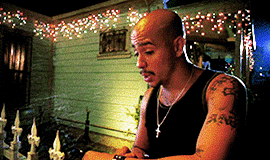
Eli Navarro would have kept on indefinitely never considering or talking about what he and Logan have been doing, but Logan Echolls can't.
holding on (trying hard to understand) - Eli "Weevil" Navarro, Logan Echolls, 1,786 words, Teen.
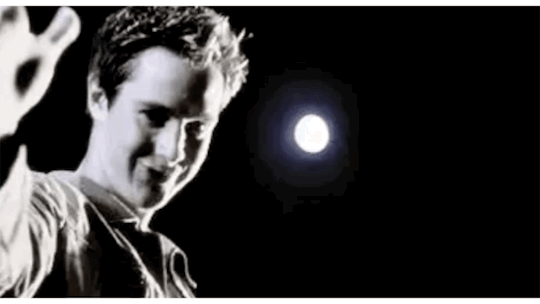
Two lonely boys in pain haunting the bridge that took someone from them.
#dany x jorah#jorleesi#elendil x miriel#mirendil#adar x earien#janeway x chakotay#logan x weevil#logan echolls#eli weevil navarro#rachel matheson#sebastian monroe#miles matheson#miloe#julia neville#tom neville#lodessa writes fic
16 notes
·
View notes
Text
Character Spotlight: Emergency Medical Hologram
By Ames
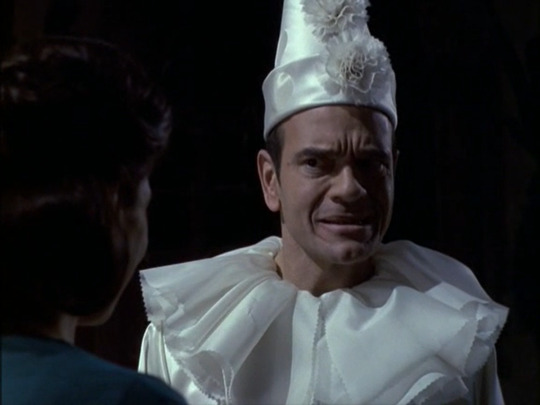
Please state the nature of the medical emergency. For a hologram who was never constructed to be left on indefinitely, the Emergency Medical Hologram sure does get a lot of development. He starts off Voyager as an insufferable computer program, grows to learn to fight for his own agency, and ends Voyager as an insufferable computer program of an entirely new ilk! What an arc!
Your hosts here at A Star to Steer Her By are quick to cringe at some of the Doctor’s squickier moments (that are interestingly heavily weighted toward the final seasons of the series), but there’s a lot to champion him for as well! The EMH makes us view artificial lifeforms like him as people, in the same way that Data did on TNG. So make sure your mobile emitter is firmly attached as we dive into the Best and Worst Moments of Voyager’s chief medical hologram below and on this week’s podcast episode (activate at timestamp 1:05:06). Hey, I’m a blogpost writer, not a doctor.
[Images © CBS/Paramount]
Best moments
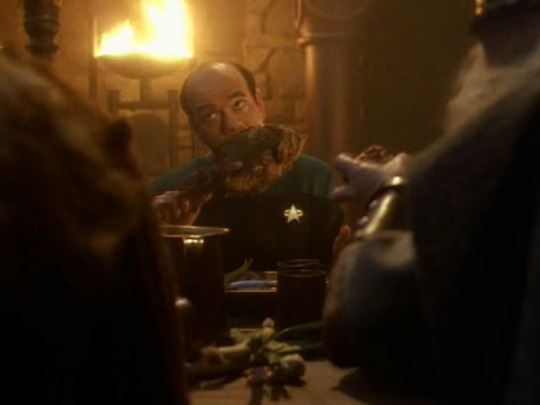
Inside you there are two Beowulfs For the first chunk of the show, the Doctor is confined to sickbay for the most part due to his holographic nature, so when he gets to do a hologram-appropriate mission in “Heroes and Demons,” it’s an adventure unto itself! He romances the bonny lass Freya. He solves the mystery of the disappearing crewman. He literally lives out an epic tale and it’s so engaging!
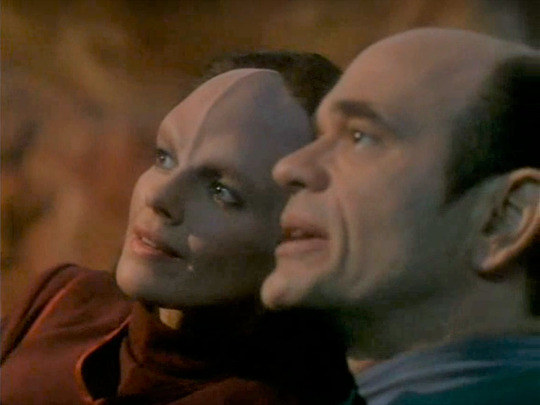
Before I met you, I was just a disease If you liked the Doctor’s relationship with Freya, you’re going to love his relationship with Danara Pel in “Lifesigns.” It’s probably the most genuine we’ve seen the Doc so far, as it’s clear he wants to do what’s best for the diseased Vidiian woman who hates her own body. But he urges her to keep fighting and keep healing because he loves her, the real her.
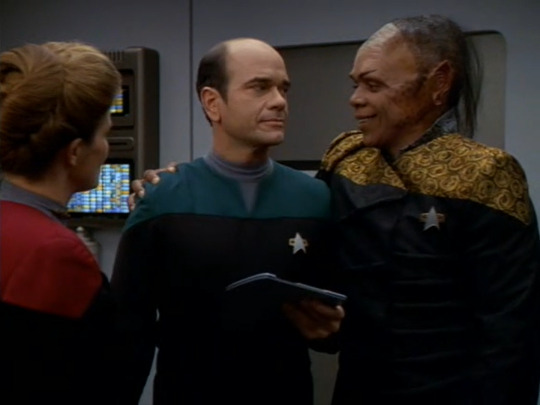
A physician must do no harm Boy, do we love it when our chief medical officers get righteous about their patients. We saw it with McCoy, we saw it with Crusher, and we saw it with Bashir. And now the EMH ends up being the only person on the Voyager to not silently condone splitting Tuvix in half in “Tuvix.” Sure, he doesn’t do anything to stop it either, but he makes it clear that what Janeway is doing is wrong.
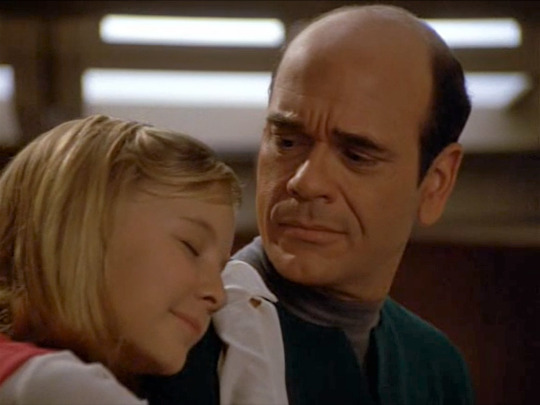
You’re too sick to get better We’ve given B’Elanna and Tom some credit for helping the Doctor experience what it’s like to have a family in “Real Life,” but the actual growth we see is all his own. Deciding (with some encouragement from his friends) to be with his holo-daughter Belle as she dies is heart-breaking, but also encouraging for the Doc to treat the situation so realistically.
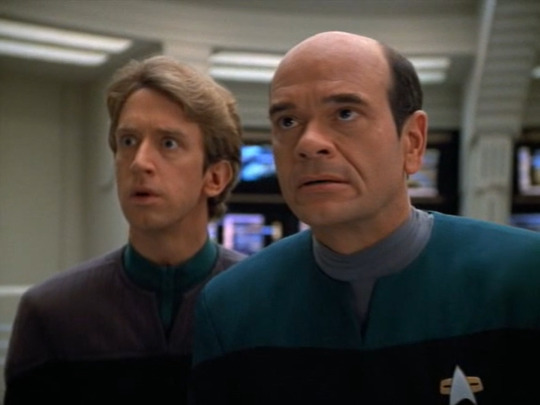
Two holograms, alone. Romulans on one side, Starfleet on the other. Alarms beeping everywhere. We see time and again the EMH use cleverness to resolve a situation, even when he’s severely out of his depth as he was in “Message in a Bottle.” But that’s where two EMHs are better than one! He and the EMH Mark 2 are able to take control of the Prometheus back from Romulans, keep the ship from exploding, and even reconnect with Starfleet in the Alpha Quadrant!
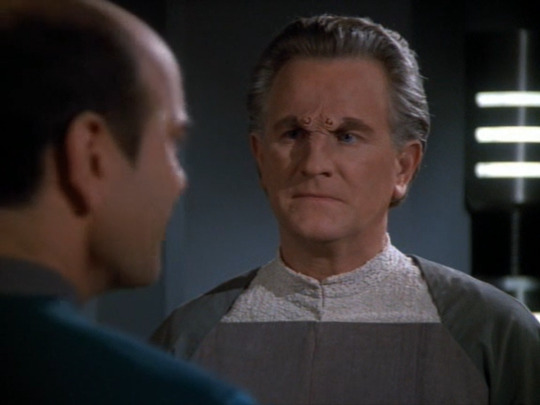
History is written by the victors Hands down, one of the best episodes of Voyager is “Living Witness,” and the EMH (or his backup program, who is essentially the same guy) really gets to shine throughout. Awoken 700 years in his future, he saves the reputation of the Voyager that the Kyrians and Vaskans have misrepresented, empowers Quarren to think critically, and keeps the two species from civil war.
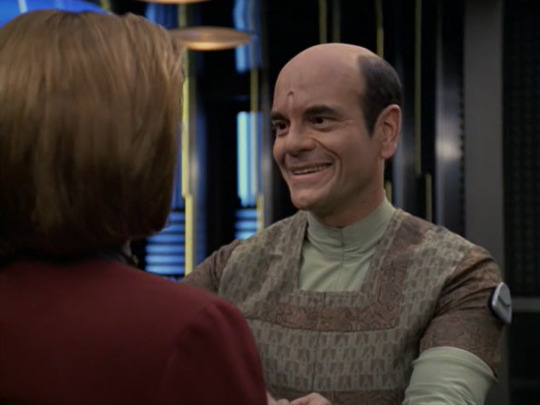
Luke, I am your father We still can’t get over the fact that, when the Doctor went down to the planet in “Blink of an Eye” to perform some reconnaissance, he comes back claiming that he somehow had progeny. We never learn in what capacity and by what method, but it definitely blows up our skirts to know that the EMH somehow had a son whom he sadly had to disappear on.
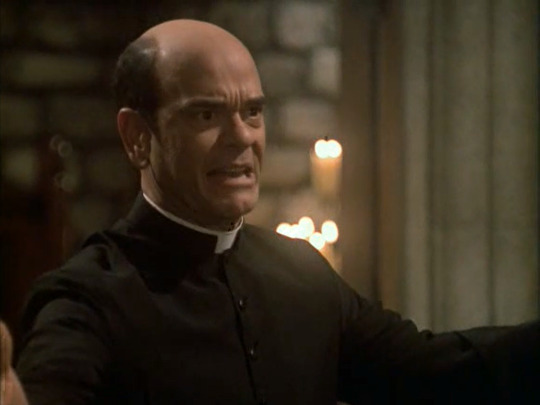
You have the audacity to turn a house of worship into a prison? Jake just loves this little moment from “Spirit Folk” to death. It’s just the line delivery of the EMH as Father Mulligan in the Fair Haven holoprogram storming into the church and shouting “Sinners!” at all the Irish townsfolk who’ve taken Harry and Tom prisoner. He does get captured too and his mobile emitter gets swiped, but what a great line delivery from Robert Picardo.
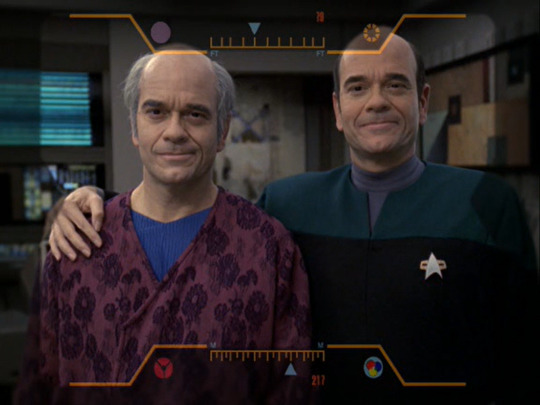
Extremely Marginal Housecalls When the EMH’s creator, Dr. Zimmerman, is terminally ill in “Life Line,” our hero packs his bags for a trip to the Alpha Quadrant to cure him. And it takes a lot of coaxing and even some covert subterfuge to get to two egomaniacs to see eye to eye, even if all of those eyes belong to the same actor. But the Doctor succeeds! Turns out you can teach a Mark One new tricks.
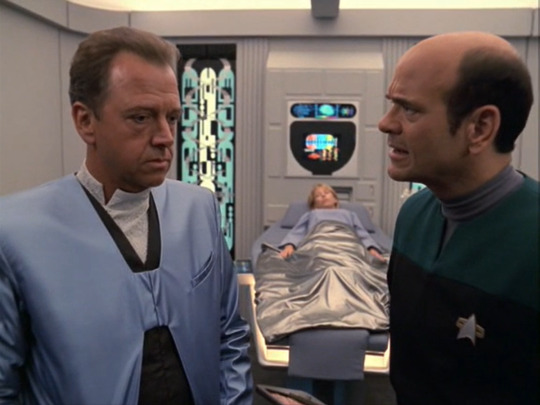
My Treatment Coefficient is one When he’s kidnapped and forced to work on the Dinaali hospital ship in “Critical Care,” the Doctor is quick to observe the unethical medical practices, classism, and hypocrisy in their systems. And not only that, but he finds a clever way to work around their tight regulations to force the medical administration to care for all of its patients, not just the elite.
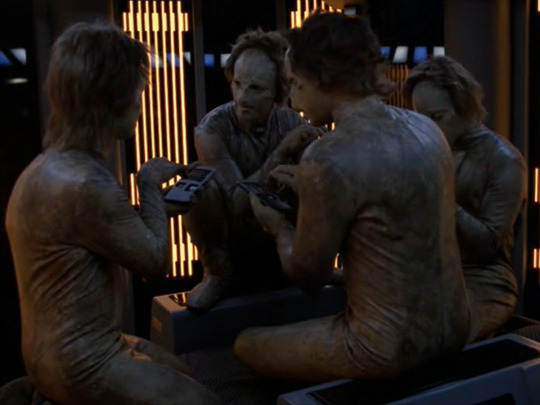
Hoshi, eat your heart out Though not the linguist that Ensign Sato is on Enterprise, the EMH is able to create a language that Fantome’s people can use to communicate in “The Void.” It’s no surprise that it’s derived from music which both the Doctor and Fantome share an affinity for, but it’s also a great moment of empathy when Doc and Seven determine these alien pests are more than they appear.
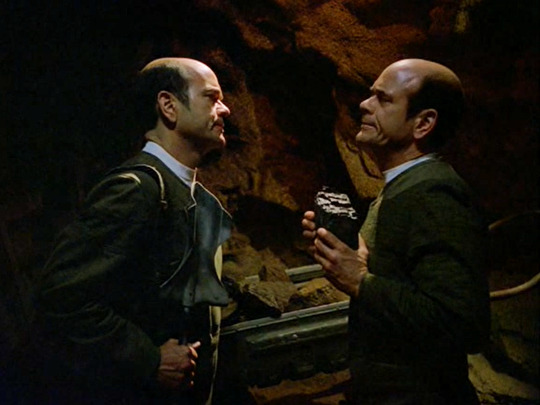
The holoprograms have nothing to lose but their chains We’ll go off in our next section about how the EMH is kind of a twat when he writes his holonovel, Photons Be Free in “Author, Author.” But on the flipside, his words also prove to be empowering to other sentient holo-people like the obsolete EMH Mark Ones out there. His depiction of subservient life as a holo-person may just start opening minds to their human rights.
—
Worst moments
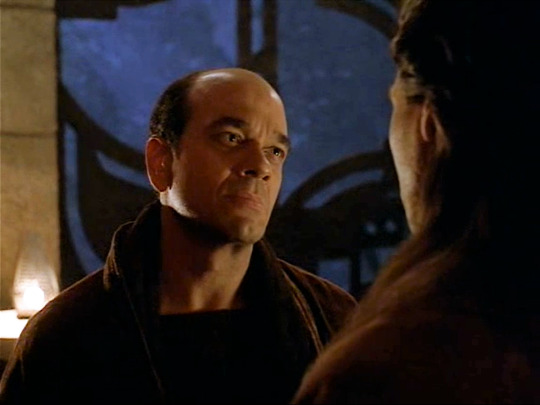
The Strange Case of Dr. Doctor and Mr. Doctor Whoever gave the EMH the power to tinker with his own programming was just asking for trouble. One of the first things he does in “Darkling” is turn himself into a Mr. Hyde who is even more appropriate to the Robert Louis Stevenson novel than Kirk in “The Enemy Within.” And he somehow becomes even grosser around Kes than usual, which is saying something.
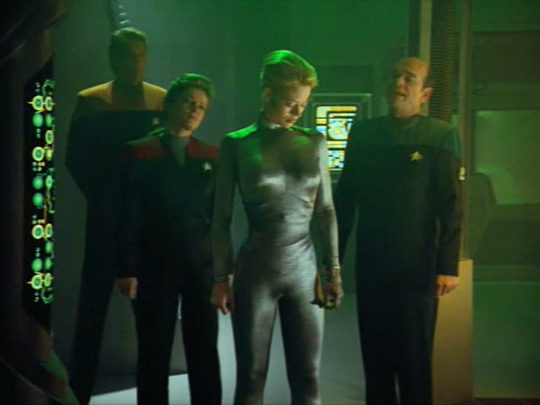
You are out. Auf wiedersehen. Fascinatingly, almost all of our Worst Moments take place after Seven of Nine has joined the crew. Maybe it’s because the Doctor starts getting more to do, and that includes more BAD things to do. Maybe it’s because he spends way too much time sexualizing Seven, as he does in “The Gift” by designing for her the ugliest, cringiest, most uncomfortable catsuit we’ve ever seen. Maybe it's something else. Let’s explore this trend…
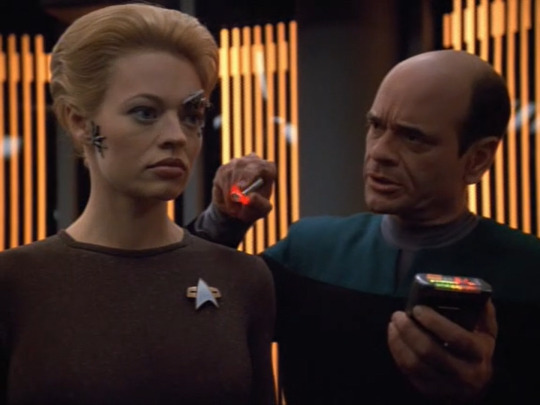
Now you will cluck like a chicken And we already have a really awful example in “Retrospect” when the EMH peddles really problematic pseudoscience on Seven instead of impartially investigating the circumstances. He’s not even a little bit unbiased when he surveys the Entharan lab for evidence. But what we can’t forgive the Doc for is literally hypnotizing Seven – some mystical claptrap with no science behind it!
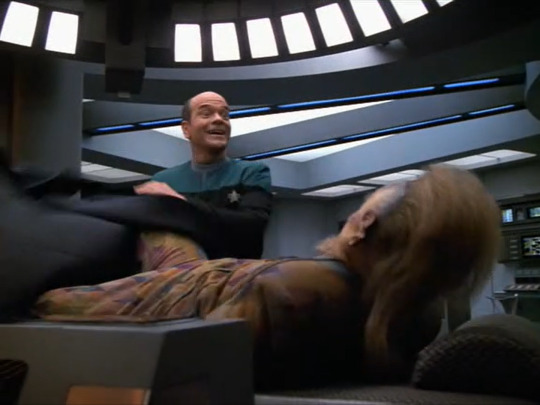
Rise and shine! The EMH has always been a bit of a prick, but usually he knows how to compromise for the good of the crew. So it’s actually a big negative to see how selfish and rude he is to Neelix and the other displaced crewmembers in “Demon” when the whole ship is bunking up to save energy. Dude, everyone is being inconvenienced here. The least you can do is let them sleep.
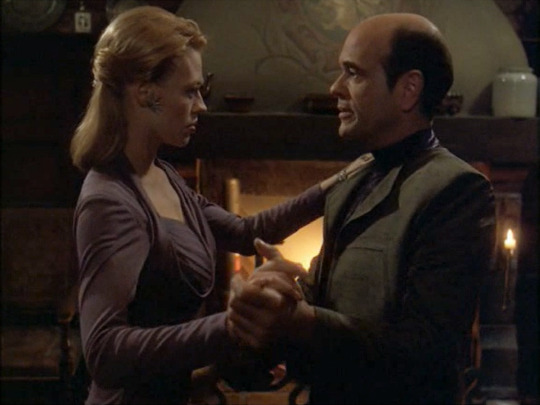
By George, I think she’s got it! Here’s another example of the Doctor treating Seven of Nine like a sex object instead of a peer! We’ve already given Tom grief for this one, but in “Someone to Watch Over Me,” the EMH recasts himself in the role of Henry Higgins to Seven’s Eliza Doolittle, and it’s just upsetting! Why can’t these men let Seven have her own agency without making it all about themselves?
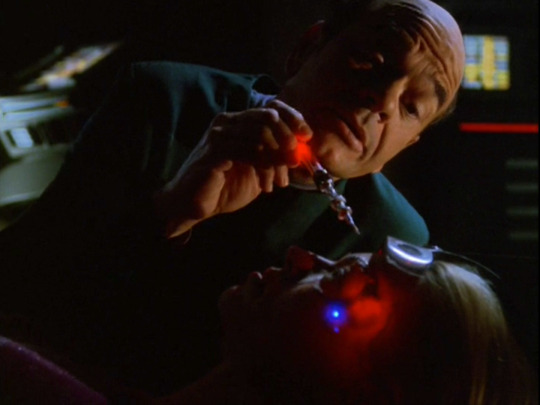
Yep, here’s your problem: someone set this thing to evil It really shouldn’t take just turning off the EMH’s ethical subroutines for him to turn into a psychotic torturer like he does in “Equinox.” Does he not have common sense or the Hippocratic Oath or even anything better to do than torture Seven just because he’s told to? Just because he now CAN do unethical things apparently means he can ONLY do unethical things.
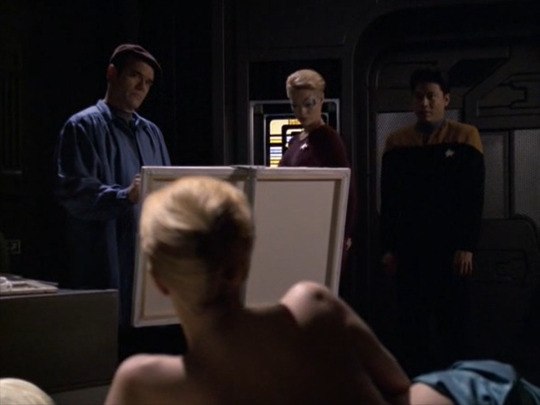
The dream dreams the dreamer… in bed I admit, I can’t judge someone for their private thoughts since no one other than telepaths would even know what they are. But the sheer concentration of the Doctor’s perverse daydreams all through “Tinker, Tenor, Doctor, Spy” is a little much. When you can tell that he’s painting Seven in the nude just to titillate the audience, that might be bad writing, Berman.
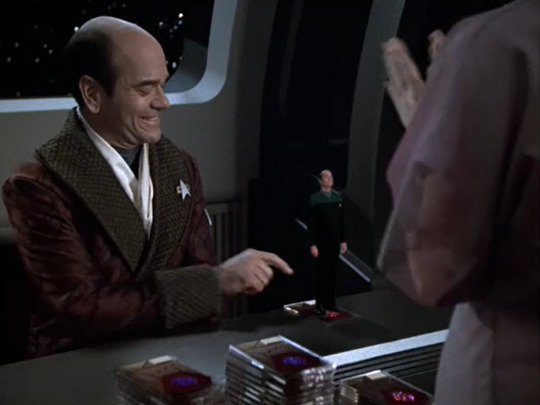
Do, Re, Mi, Fa, So, La, Ti, DOLT There’s something about seasons six and seven that turns the Doctor’s insufferableness up to eleven. When the Qomar inexplicably fawn all over him for his singing ability in “Virtuoso,” the ol’ doc really lets it all go to his head and is ruder to the crew than ever before. He’s even prepared to stay with the tone-deaf aliens because they unconditionally treat him like a celebrity.
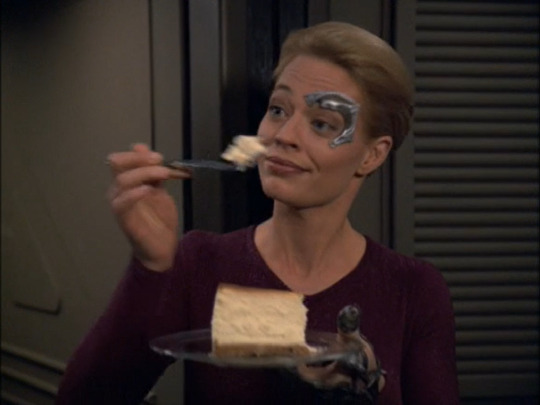
This one takes the [cheese]cake Everything from “Body and Soul” paints the Doctor in a really ugly light and, especially in the final season of the show, it makes it hard to come back from the impression of him as unsympathetic, self-centered, and abrasive. So when Seven expresses that he has violated her body while he was possessing her and his response is to blame her, that is starkly unforgivable.
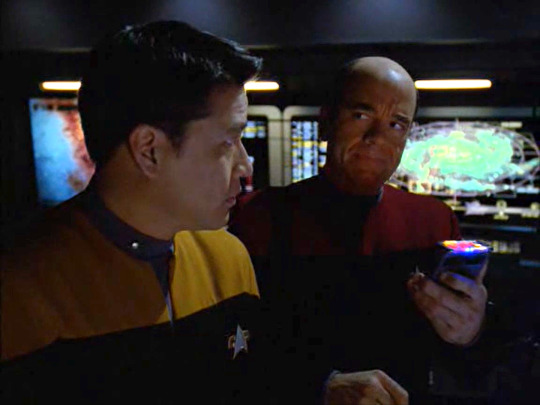
Anything you can do I can do better – I can do anything better than you This is the same as one of the extremely out-of-character moments from Harry Kim’s Worst Moments list from last week, but it warrants repeating. What the hell was the deal with the dick-measuring contest between the ECH and Kim in “Workforce”? For that matter, what is the Doc even doing as the ECH right now? Chakotay is back and in command! Step down already!
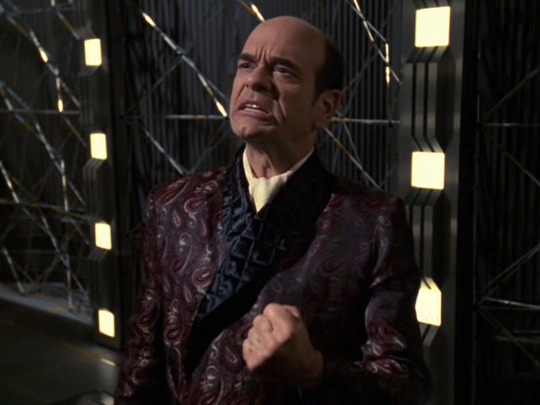
Once upon a Seven of Nine We gave the Doctor credit for speaking for holo-people in getting Photons Be Free published in “Author, Author,” but the way he workshopped it left much to be desired. How freakin’ hard would it have been to make the characters in his story more randomized and NOT just exaggerated, cynical versions of the crew? It would’ve been so easy to save face, my dude!
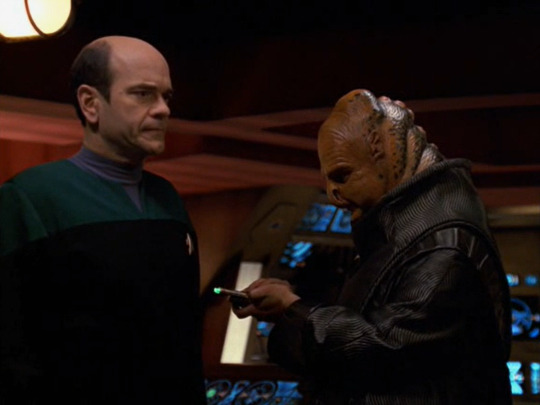
One Po-turd-o, Two Po-turdo-o, Three Po-turd-o, Four! I may be alone in my hatred of the turd people in “Renaissance Man,” but I maintain that the EMH shouldn’t have so eagerly (and boringly!) helped them. But what we can all agree on is that his confession to Seven when he thinks he’s dying is disgusting and a terrible impression for his character to basically go out on:
“You have no idea how difficult it's been, hiding my true feelings all these years, averting my eyes during your regular maintenance exams.”
VOMIT!!!
—
Computer, deactivate Emergency Medical Hologram. That’s all from the EMH, until we maybe revisit him when we get around to character spotlights for Prodigy which you are surely watching because it is stunning. For now, we’ve got some more Voyager characters to spotlight here and some more Enterprise to watch for the podcast over on SoundCloud or wherever you listen. You can also give us your medical prognosis over on Facebook and Twitter, and maybe tone down the “I’m a doctor, not a”s a little bit.
#star trek#star trek podcast#podcast#voyager#emergency medical hologram#emh#the doctor#heroes and demons#lifesigns#tuvix#real life#message in a bottle#living witness#blink of an eye#spirit folk#life line#critical care#the void#author author#darkling#the gift#retrospect#demon#someone to watch over me#equinox#tinker tenor doctor spy#virtuoso#body and soul#workforce#renaissance man
19 notes
·
View notes
Text
Star Trek, part 6: Voyager (another Gilligan's Island in space)
[All images are owned by Paramount. Please don’t sue me]
With DS9 well under way and the first movie starring the TNG crew (more on that in a future review)…established, Rick Berman decided it was time to debut a new crew to the Star Trek continuity. Obviously, this couldn’t be the Enterprise (that name was tied up in the films, after all!) and doing another show on a station seemed redundant. So for the first time, a Star Trek series would feature a brand new starship designation!
youtube
(Thanks to webguy404)
Voyager made a few casting choices that put many fans up in arms (such as a female captain and a black Vulcan) I didn’t have any issues with either, wanting to see a compelling story about characters I grow to care about. One change behind the scenes would have lasting implications: Rick Berman brought in a new writer/producer named Brannon Braga, who tended to give no more than lip service to continuity. If there are continuity errors between this series and the one I will be reviewing in the future, odds are Braga’s hand’s in there somewhere.
But for now, let’s take a look at the star of the show.
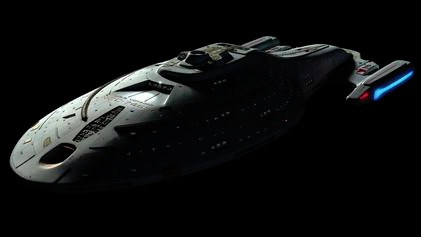
(Thanks to Wikipedia)
USS Voyager (NCC-74565) is an Intrepid class starship that was unlike any version of the Enterprise in one respect:
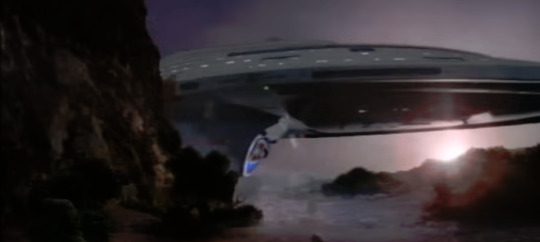
It could actually land!
Voyager is on its maiden voyage and first mission, to track down and capture a Maquis ship hiding in a region of space near Bajor known as the Badlands. However…
youtube
(Thanks to April 5, 2063)
Upon their arrival in the Delta Quadrant, Voyager found the Maquis vessel (which was also ship-napped) Several members of both crews were dead (including Voyager's entire medical staff, its First Officer, and and its Chief Engineer) The commanders of both ships realized the two crews needed to work together if either were going to make it home, so the Commander of the Maquis vessel became Voyager’s new First Officer and began their trip home (though, this being a Starfleet vessel, they were going to learn as much as they could about the Delta Quadrant along the way)
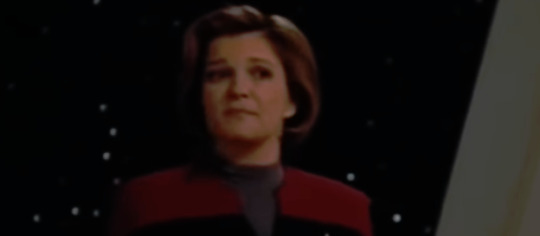
Voyager’s Commanding Officer is Captain Katherine Janeway (played by Kate Mulgrew, who previously was known as Mrs. Columbo) Janeway is hard on her crew, because she knows there’s no one to call for help. However, she also is more empathic toward them, as all they have is each other.
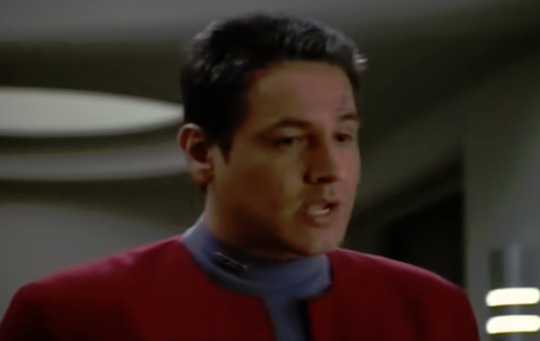
The Maquis Commanding Officer is Chakotay (played by Robert Beltran), who was a Starfleet officer before joining the Maquis. Janeway gave him the provisional rank of Commander and made him First Officer. He has loyalty to his fellow Maquis survivors (placing a few in positions of authority on Voyager), but he is devoted to Voyager and its mission to bring everyone home.
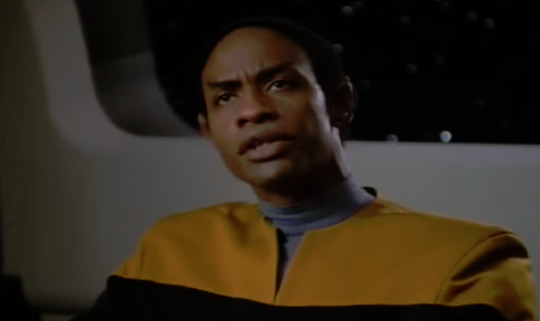
The Second Officer and Tactical Officer/Head of Security is a Vulcan named Tuvok (played by Tim Russ), who was a Federation spy for Janeway aboard Chakotay’s ship when it was taken. Obviously, he and Chakotay butted heads when the crews first integrated, and he resented teaching discipline to some of the more unruly Maquis crewmen, but has learned to adapt and compromise in the face of the clash of cultures.
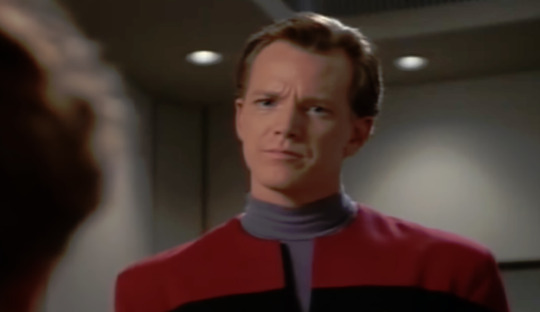
Lt. Tom Paris (played by Robert Duncan McNeill) is a screw-up who Janeway recruited (from a Starfleet prison) due to his knowledge of the Badlands. After the death of Voyager’s helmsman, Paris was given the position and straightened his life out. Paris is a fan of 20th century sci-fi pulp fiction, often using his time in the holodeck to create stories called holo-novels (and we all know how things tend to go when the holodeck gets involved)
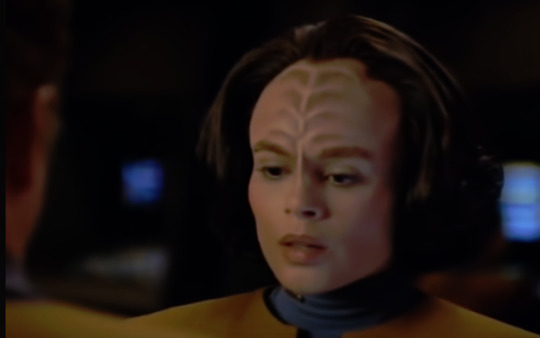
B’elana Torres (played by Roxann Dawson) is a half-Klingon who served as Chakotay’s Engineer before the crews were integrated. As Voyager’s Chief Engineer was dead, Chakotay recommended her. Janeway gave her a provisional rank of Lieutenant and assigned her. She and Paris fall in love over the course of the series, get married, and have a child together.
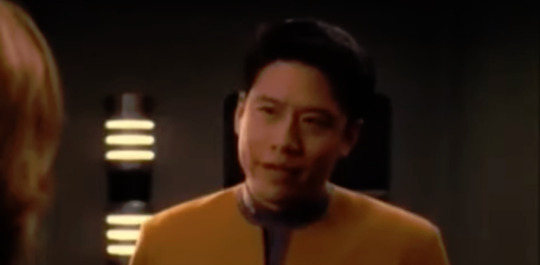
Ensign Harry Kim (played by Garrett Wang) serves as Operations Officer, monitoring the multiple systems required to keep Voyager running (not easy, since he’s had to adapt several Delta Quadrant technologies into Voyager to keep the ship running) He is constantly questioning his ability to do the job he needs to do (even as he does it successfully) He becomes best friends with Paris, often helping him with his holo-novels.
Despite his competence at the position, Ensign Kim was never promoted during the series (the writers told Wang “Someone has to be the Ensign!”)
As I mentioned earlier, the entire medical staff was killed when Voyager was abducted. The problem is, someone needs to take care of the crew when space travel turns deadly. Fortunately, the writers Starfleet has a solution.
youtube
(Thanks to Carol Bee)
The Emergency Medical Hologram (or EMH; played by Robert Picardo) was designed to support the medical staff in case there is a major emergency or the Chief Medical Officer is incapacitated. It certainly wasn’t designed to be the Chief Medical Officer for over 70 years! Unfortunately, that is exactly what the EMH (or simply “Doctor”) is asked to do. As he was not programmed for “bedside manner,” he can be more than a bit gruff (fortunately, he was programmed to learn, as there are a TON of illnesses he couldn’t be programmed to treat as they haven’t been discovered. Therefore, his demeanor has softened over the years) He apparently has a few McCoy subroutines in his programming as “I’m a doctor…” has found its way back into the franchise.
Unfortunately, as he’s a hologram, he can only be of use where there are holo-emitters (i.e. sickbay and the holodecks) Eventually, thanks to time travel (more on that later), he acquires a device from the 29th century called a mobile holographic emitter that allows him to travel freely.
But the Maquis aren’t the only ones who are integrated into Voyager’s crew.
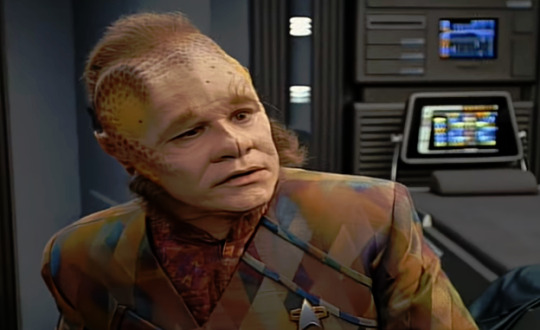
Neelix (played by Ethan Phiilips, previously known for his role on Benson) is a Talaxian salvager who Janeway recruits as a Native Guide through the Delta Quadrant, but assigns himself as Morale Officer (often trying to get Tuvok to show emotions, but only succeeding in annoying him) and ship’s cook. His knowledge of the races Voyager initially encounters proves invaluable.
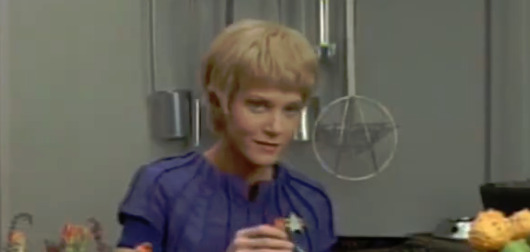
Kes is an Ocompa and Neelix’s girlfriend. Ocompa only live for 9 years (so Neelix had better work fast!) As her time on Voyager progressed, she developed telepathic and telekinetic abilities that increased exponentially. Eventually, she would leave Voyager, using her abilities to push Voyager over 9,000 light years farther along in their journey (that’s some exponential jump!)
Of course, in the Delta Quadrant there are threats that the Federation have never encountered (and unfortunately two that are VERY familiar)
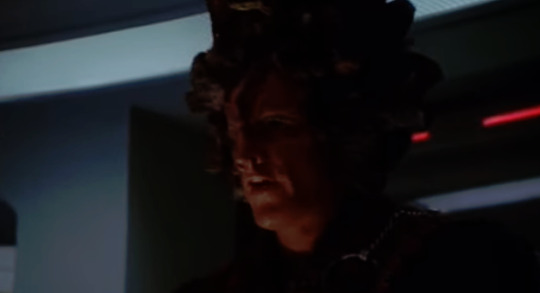
The Kazon are a warlike race (are there really any other types capable of space travel on this show?) that are highly factionalized. They would likely be a credible threat if not for the fact that the factions are at war with one another for supremacy. As such, they are really little more than the sci-fi equivalent of street gangs.
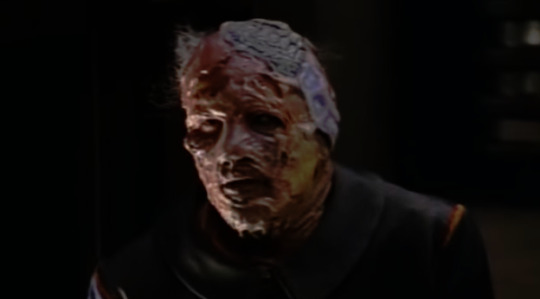
The Vidiians are a scavenger race (what they scavenge is organic material from living hosts!) They are affected by a disease known as the Phage that breaks down organic material. The Vidiians need a fresh supply of uninfected organic material to replace what breaks down. While not a threat to the ship, they have killed members of the crew so they could survive.
Before I mention the final new race, I’d like to bring back some old…favorites?
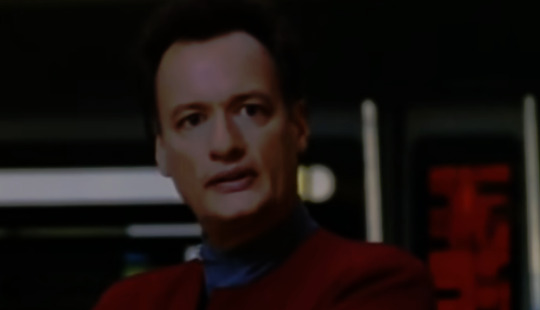
Q returns once again to annoy Voyager, but this time his appearances tell a story! He first returns when another Q wants to commit suicide. Then Voyager is thrust into the middle of a civil war among the Q Continuum, then the first Q birth in millennia happens…and Janeway is the godmother!
Next, prior to Kes’s telekinetic boost, Voyager’s journey came into contact with…
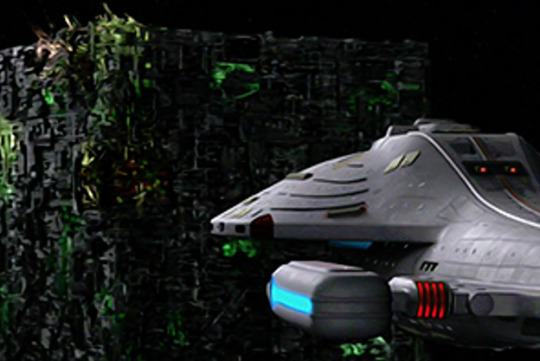
…the Borg!
The Borg seek Voyager’s help, in exchange for a path back to Earth, in dealing with the one race that is a legitimate threat to them.
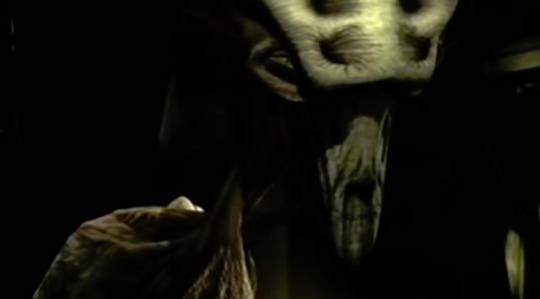
A race the Borg designate as Species 8472, a race that lives slightly out of phase with the universe. The Borg modify Voyager assisted by one of their drones…
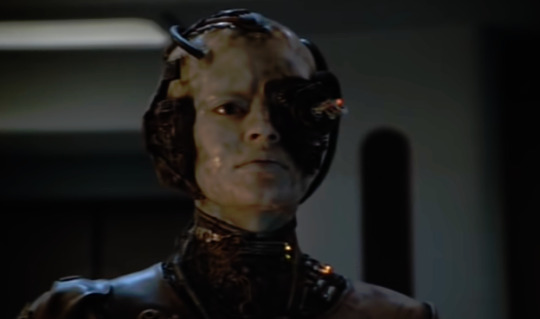
A drone designated "7 of 9, Tertiary adjunct of Unimatrix 01" (played by Jeri Ryan) After driving Species 8472 away, the Borg betray Voyager using 7 of 9, but Janeway is ready for a betrayal and manages to cut the drone from the Collective. Without the link to the Collective, 7 of 9’s body rejects most of her implants and her hair begins to grow out rather quickly.
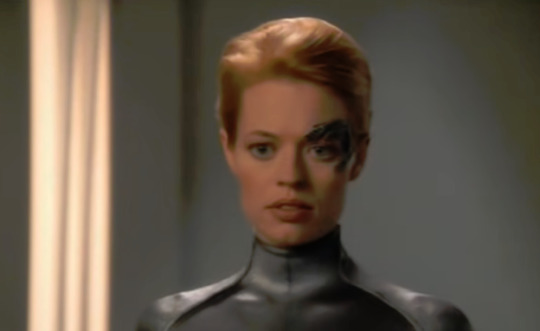
Throughout the rest of the series, 7 of 9 (or simply “Seven”) has to re-learn what it means to be human and attempt to merge her lessons with what’s left of her Borg programming (similar to Data’s journey be learn what it means to be human) She uses what she remembers from her time with the Borg to do major upgrades to Voyager, potentially shaving years off of their journey.
Along the way, Voyager is able to make contact with Starfleet Command to let them know they’re still alive.
youtube
(Thanks again to April 5, 2063)
Aside from trying to get home, one recurring theme (and I can't help but think Braga had a major hand in this; I have no proof, just a general feel) is time travel. Voyager is constantly visited by the 29th Century version of the Federation (which is how the Doctor gets his mobile emitter) to the point that we learn that the Federation adapted the Prime Directive to deal with time travel (a Temporal Prime Directive: Do not interfere with history) Additionally, a number of Voyager's crew meet future versions of themselves attempting to correct mistakes they made in their past (time travel always makes my head hurt)
The series lasted for seven seasons (what is it with TNG-era Trek shows lasting seven seasons?), with the show ending in the best possible way.
youtube
(Again, April 5)
If you would like to watch the show, it’s available on Paramount+ or behind your favorite paywall. If you would like to see an episode reviewed, please let me know!

And now (because I couldn’t think of a better place to include it), I would like to present a non-canon meeting of the generations…
(Sorry I had to link it this way, I couldn’t find the full production in one video)
(Thanks to itzhakts and Mischa Lecter)
…and the sequel!
youtube
(Thanks to The Warp Core)
#star trek#voyager#kate mulgrew#robert beltran#roxann dawson#jennifer lien#robert duncan mcneill#ethan phillips#robert picardo#tim russ#garrett wang#jeri ryan#fan colored glasses
7 notes
·
View notes
Text
here are some on the spot impulse ideas for voyager tenebres au for fun hahaha
i have my tenebres headworld lore here but yknow its not pretty lol
general premise::::: modern day (not the future, no spaceships) hidden societies of magic but on the surface most characters can pass off around normal people (referred to as commonfolk). a few mages are sent to apprehend some disruptive parties (the maquis) tuvok has still infiltrated their group, janeway is searching for him, etc etc. figure the caretaker would be a magical entity (classified as fae) that pulls them all into a whole other world thats like, midieval fantasy type setting with no modern technology. i figure its not SUPER magical like its mostly humans.
kathryn::::: a mage whos devoted her life to serving the basilica (which is essentially like magic police lol they govern and enforce magic stuff) shes sent out to capture some defectors idk what they did or how or why but shes gotta apprehend them. the basilica deals with magic law and governs over magefolk and handles magic “breaches” which are exposure risks to the commonfolk (normies). all that to say theyre probably doing something naughty probably going against the entity she serves and kathryns gonna bring them to justice. shes renowned as a mage (shes good at magic). excels in alchemy!!!! but take that away from her and she’s pretty helpless. figure shed either get stuck as an animal or a monster for a bit (threshold). idk if it’d be permanent 😘 idk if she has accidental triplets 😘 maybe it takes away her magic. she struggles riding horses.
chakotay: mage, did something unpoggers in the eyes of the basilica. originally worked for the basilica but left after him papa got killed, same type of beats. uuuh i think hed have trained to be good at more tactical and combative magic, but his secret love is in stuff like history and all that. was also thinking hes good at like dream-based magic and also is a silvertongue :3 thought maybe sekaya would be a deer familiar but idk.
tuvok: mage or fae, idk. undecided haha.
tom: mage, was in prison but janeway released him to help her track down the maquis. idk what hed be good at, possibly nothing.
belanna: origin werewolf (means she was born a werewolf)
harry: mage (or commonfolk who is an undiscovered mage? 🤨)
seska: human-passing monster, vampire?????? cursed mage???? idk
the maquis are a lot more blendy with their statuses. more inclusive of monsters. janeway’s people are all magefolk except maybe tuvok.
4 notes
·
View notes
Text
Voyager rewatch s3 ep3: The Chute
I hadn't watched this one since it originally aired. It's not one I disliked, per se, it's just one I didn't enjoy, since it's not any fun to watch your favorite space bros get put through horrors. Looking at it through a more critical lens as an adult, though, I can at least appreciate it more than I could as a 9 year old kid, who was experiencing it more viscerally as something bad happening to characters I liked.
This was a pretty big episode for Harry, since most of the focus was on him for the first time since season 1. Less so for Tom, because he was basically dying from a stab wound for most of it, but their friendship was the main theme of the episode.
I didn't like the cold open starting right in the prison setting, since it felt like playing catch up to figure out the context of what was happening. I'm sure they were going for shock value for the audience, presumably because they thought it would mirror the characters disorientation, but the characters would have had some context for where they were from the events that preceded being sent there. I would have liked to have had a scene on the planet, so we get the sense of surprise and dread as one minute everything is fine, then the next minute they're hauled away. (And it really should have been an actual away mission- are they kidding us that it was shore leave?! Seriously?! The Captain just let the crew beam down to some unknown planet without knowing anything of their society or their laws?? Did everyone simply forget that time on the Enterprise when they did that, and a bunch of half-naked blonde people tried to kill Wesley Crusher for stepping on a plant?? Really?!)
But we just get exposition dialog instead, and find out about the implants in their heads that make everyone more violent, and we find out that Tom apparently just carries a knife around when he goes on shore leave?? What?? Maybe he's meant to have stolen it from another inmate, idk, but that probably should have been explained, since that's very much not a Starfleet thing. (I mean, sure, he's been in prison before, but Federation prison seems more like a nice vacation than a gritty dog eat dog hellscape like this one lol.)
We finally get a little respite from gritty prison hell with some scenes on the ship with Captain Janeway and crew trying to find Tom and Harry (with bonus concerned B'Elanna- I love that she's become bffs with Harry and Tom now, aww).
Anyway, Tom saves Harry from becoming some other prisoner's bitch, I guess?? It's never actually clear what exactly the other guy wants Harry for, but in the context of actual prisons, one can imagine what they'd want the young pretty boy for, ew. But Tom makes it very clear that Harry is his bitch belongs to him (nope, still sounds pretty gay, lol die mad about it Berman!) and they plot an escape. Harry tries to rewire the chute they came in through, but Tom gets stabbed defending him, and 100s of whump fics on Ao3 were born now Harry is the one who has to take care of Tom.
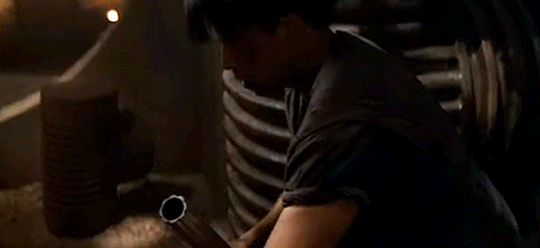
They make an alliance with the resident crazy manifesto guy so he'll let them share his shelter (though why any of them need a shelter when they're indoors is a bit of mystery- y'all are all under one roof dudes, just pick any corner, you don't need a tent over you, it's not gonna rain inside a room!! The ceiling doesn't have weather patterns!! Lol wtf??) and he tries to convince Harry to give up on Tom and let him die to save himself, which Tom, who loves risking his life to save other people every other episode, does too. But of course, even starving and beaten and with an agression chip in his head, Harry would never do that to his bff. One of the things I feel worked in this episode was seeing Harry get put in this truly awful situation, and never break. For all he's the inexperienced baby marshmallow of the Voyager crew, we see him really grit his teeth and fight through it all with his Starfleet ideals held firm. There's a rather nice shot that follows him walking around the prison, and stays on his face as he goes through all the emotions of anger and frustration and doubt as he struggles to ignore manifesto guy's defeatism and stick to his course of saving himself and Tom. It's a really nice moment where we get to see that sweet little Harry actually has an iron will underneath it all.
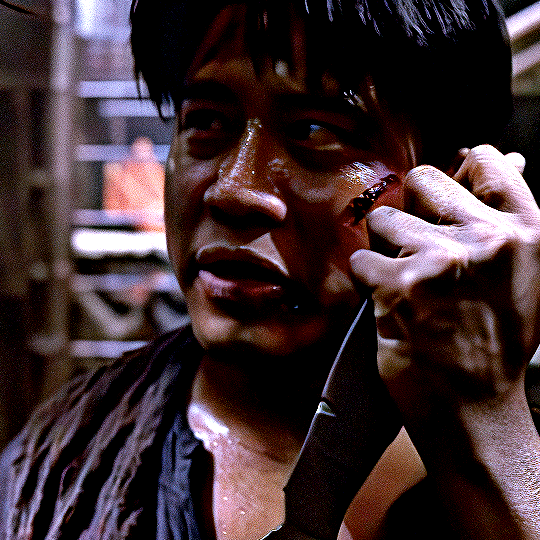
And of course, the scene where he takes care of Tom while he's sitting there dying is just heartbreakingly tender. When Tom gets so sick that he stops being self-sacrificing and tells Harry not to leave him, it's hurts, for Harry and for us. Of course it spurs Harry on to take on an entire prison to protect him, but luckily, their mom comes to pick them up in the nick of time- Captain Janeway has been working to track them down, and when diplomacy fails, she opts for a prison break. She jumps right in there with a rifle to get her boys home- and it's honestly glorious. Prudently, she did bring back up, but tbh, you believe this one tiny woman could terrify a horde of violent men singlehandedly. All hail our badass space mom!
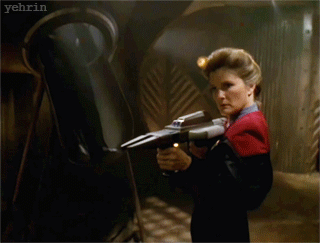
In the last scene back home on Voyager, Harry is visibly still shaken, as anyone would be. Tom is chatting away normally, as if he hadn't just been on death's door, because he knew he had Harry to get him through it. Which is very sweet, but honestly it felt a little too shallow, given the circumstances. Tom was mind controlled, starved, stabbed, and almost died, that's some pretty traumatic stuff he should be processing, it shouldn't be cutesy time at that point yet. If they wanted the cute ending, why do this story? Why did they have to go through hell just to say 'hey, I appreciate you being my friend and looking out for me'?? And if they really wanted to do this story- at least have the characters process the trauma, and like, give each other a hug, for crying out loud!
I couldn't get away from the feeling that this whole story was kind of predicated on an underlying toxic masculine sensibility that men can only express love and devotion to another man if one or both of them are dying. It reminded me of that art piece I've seen around, the one that says something to the effect of 'you construct elaborate rituals to touch the skin of other men'. Which also reminds me thematically of another Voyager ep that's coming up later, where Captain Janeway goes through this elaborate ritual and puts herself through trials she didn't really need to because she thinks you're supposed to suffer to gain the prize or knowledge you need. This episode felt like that, on a meta level- while I appreciated highlighting the unshakeable bond between Harry and Tom, why did we have to put them through hell, and mind control, starve, beat and almost kill them, to do it? It's not pleasant to watch, and I never have rewatched in all these years till now, because whatever good there was here- and there was some good- it didn't really feel justified. I knew Tom and Harry loved each other and would do anything for each other already, without having to torture them to get them to show it. And I have to believe that by the 24th century, we'll have a better society, where men can tell other men how much they love each other without having to suffer to justify it.
2 notes
·
View notes
Text
Episode Reviews - Star Trek: Voyager Season 7 (6 of 7)
Episode 21: Friendship One
Plot (as given by me):
Having established two-way communication with Earth recently, Voyager is given its first official assignment by Starfleet since becoming lost in the Delta Quadrant. Four years after the event known as First Contact, humans launched a probe called Friendship One into deep space, hoping to establish peaceful communications with other species. The probe contained a variety of cultural and technological information, and was launched well before Starfleet or the Prime Directive existed. According to Starfleet, the probe’s last recorded position is close to Voyager, so Captain Janeway and her crew are tasked with finding it.
With Harry compensating for local phenomena Starfleet couldn’t account for, Voyager soon tracks the probe to a planet that is in the midst of a nuclear winter. An away team heads down in the Delta Flyer, as atmospheric radiation makes teleporters inoperable unless aided by transport enhancers. Tom Paris, Neelix and Lt. Carey locate the remains of the probe, but are taken prisoner. Chakotay and Harry, meanwhile, subdue an intruder before the Delta Flyer comes under attack and they’re forced to leave.
It ultimately turns out that the species who lived on the planet used the probe’s database to construct an anti-matter energy system for their society, which then suffered a containment failure. Many of the people are hostile to the Voyager crew, believing they were sent the information so they could be set up to have a nuclear accident. The survivors are led by a man named Verin, who insists that Voyager evacuate his people to another planet if they want their friends returned unharmed. As Janeway considers her options, the Doctor treats the intruder, a scientist named Otrin, who has been trying to find ways of reversing the effects of the disaster.
With Otrin treated via Seven’s nanoprobes, he and the Voyager crew soon come up with a means of aiding the planet’s population, which is just as well as it would take years to relocate the planet’s population to the closest habitable world. Verin is not happy about this, however, and kills Lt. Carey to try and force Janeway’s hand. Not long after, a pregnant woman named Brin gives birth with Tom’s assistance, but due to the radiation poisoning affecting the planet’s population, the baby is stillborn. Tom is able to revive the baby, and when a second away team arrives and takes out the guards, Tom is allowed to take the baby to Voyager for treatment.
Janeway is prepared to return the baby and leave, believing Verin’s execution of Carey means the population is hostile. However, Tom and Neelix explain that Carey’s death was purely the act of one man, and since humans caused the planet to suffer, they’re honour-bound to try and repair the damage. They opt to create a reaction in the atmosphere to eliminate the radiation using photo torpedoes from Voyager. While most of the people welcome this and the medicine being offered, Verin can’t let go of his fear and anger. When Voyager launches the torpedoes, he tries to shoot them down, but is stopped by Otrin and Brin. As the atmosphere clears, the aliens are elated to see sunlight again.
As Voyager resumes course for Earth, Janeway and Chakotay lament the loss of Carey while looking over an almost-complete model of the ship that the engineer had been building in a bottle. Janeway questions the actions of her ancestors, noting that while Chakotay is right that the urge to explore is powerful, it doesn’t justify losing lives in the process.
Review:
This episode is both the first and last time Voyager gets an official Starfleet mission while lost in the Delta Quadrant, so that makes the episode a bit unique, and serves to highlight that perhaps this show ended a little prematurely. Combined with certain other plot threads, the show could have kept going a season or two longer and this premise of Voyager having official business on its way home could have been better used. As it is, we get an episode that seems to be one-part cautionary tale regarding the risks of nuclear power, one-part cautionary tale about the dangers of sharing certain technological information too freely, and one-part giving into Voyager’s action remit, complete with the death of a recurring character. The last part gets in the way of the other parts, as there’s no real debate on the issues, no one pointing out that what the individual humans of the past did isn’t the fault of present-day humanity, etc. As a result, the net result is another flawed execution of an issue-exploration episode.
That said, it is nice to see the show trying to at least aim for substance with a lot of the recent episodes. I think this series could have done better if it had made that more of the aim instead of obsessing over action all the time. Leave the mindless space battles to the sci-fi fairytales of Star Wars and let Trek do what Trek does best; develop its characters and provide issue exploration via an optimistic vision of the future. The episode also demonstrates the overall necessity of the Prime Directive, and it points out the often-overlooked point that the actions of one man are the actions of one man. The way Janeway reacts when Carey is killed is akin to what we see in real life when someone commits a violent crime and it turns out they’re of a certain nationality, racial group or religion. When we find this out, many people will generalise that crime to the whole group instead of acknowledging that one person does not always represent their entire group.
Another flaw in the episode beyond action trumping substance is the use of Lt. Carey out of the blue to be killed. Carey hasn’t appeared on Voyager since the show’s first season, then all of a sudden, he’s shown up and developed a bit just to get killed. For me, this would have worked better if we’d seen Carey more in recent episodes, and better still if he’d appeared in the intervening seasons. This just goes to show that Voyager’s staff didn’t really seem to know their craft. Either that, or the show’s episodic nature was backfiring again here and there needed to be a serialised approach more consistent with the show’s journey narrative. Overall, I give this episode 6 out of 10.
Episode 22: Natural Law
Plot (adapted from Wikipedia):
While traveling in a shuttle to the planet Ledos for a conference on Warp Field Dynamics, Chakotay and Seven of Nine take a small scenic detour to admire the natural landscape. There they find themselves unintentionally scraping an ancient energy barrier that begins to break the shuttle apart. Seven manages to blast a temporary hole in the barrier. The shuttle falls through but still threatens to break apart. Moments before it explodes, the two beam to the surface, Chakotay's leg being hurt in the process.
They find themselves in a lush jungle. In spite of Chakotay's leg injury, they decide to search for the shuttle's debris in hopes of constructing a distress beacon. While searching, they encounter a tribe of primitive humanoids, the Ventu, living in the jungle. Because of the Prime Directive, Chakotay and Seven agree to limit their contact with them as much as possible.
While flying through Ledosian space aboard the Delta Flyer, Paris performs an illegal flying manoeuvre. Despite his years of training as a pilot, the Ledosian authorities insist he undergo one-on-one flight training to teach him how to fly safely. Janeway agrees to this, partly as a way to maintain good relations, but Paris is chagrined at a long and painstaking course under a Ledosian flight instructor.
Seven is forced to proceed alone as Chakotay is too injured to continue. As Chakotay rests from his injury, he is found by three Ventu and taken to their camp, where they begin healing his injuries. He begins to communicate with them using their sign language, and becomes impressed with their hospitality and culture. Out of necessity, Seven must affect their culture also, in order to watch out for Chakotay. The primitives come to emulate the two, even copying Chakotay's facial tattoos. One copies Seven's implants with debris taken from the shuttle.
When Seven heads off alone to look for the shuttle debris, she becomes lost after dropping her tricorder down a deep hole. But a young Ventu woman has followed her, and the next day helps her find the crashed main body of the shuttle. Chakotay catches up to them and reluctantly recruits some Ventu to help carry a deflector array to a more optimum site.
Chakotay and Seven eventually disable the ancient energy barrier using the deflector. Voyager learns the barrier was erected by an alien species in order to protect the Ventu from the Ledosians, who had been at war with the Ventu in the past. These aliens disappeared some time ago, and no one had been able to bring the barrier down until now. The shield going down opens up the habitat and its primitive inhabitants to the Ledosians, who quickly send an expedition to research and exploit the Ventu habitat. The Ledosian authorities promise Janeway that the Ventu would be well-treated, but the crew are unconvinced. But when they try to remove the shuttle deflector to close the barrier again, they are attacked by a craft from Ledos that disables Voyager's transporters. Paris, despite the protests of his flight instructor, uses dramatic and skilful piloting to remove the Ledosian team and re-establish the barrier, freeing the Ventu at least temporarily from cultural contamination by the outside world. Seven is apprehensive that the Ledosians scanned her deflector modifications and may eventually construct their own device to disable the barrier.
Review:
This episode seems like it’s trying to showcase issues of cultural exploitation alongside developing the Seven-Chakotay dynamic that is seen in the show’s finale and forecast by the episode ‘Human Error’, but it falls a little flat on both while at the same time playing reckless piloting by Tom for comedy. Given the seriousness of reckless driving as an issue in real life that costs lives, I think this episode could really have done without such flippancy. With the A-plot, it seems like there’s no real clarity to the intended purpose, as the events of the plot keep the focus so shifted from moment to moment that there’s no consistency.
If the focus was the Seven-Chakotay relationship, the pair should have been stranded alone, there should have been no B-plot, and we should have focused in more on that, perhaps with Seven opening up about the emotional fail-safes in her implants, Chakotay arguing for her to get them taken out and Seven arguing in resistance to this. If the focus was meant to be about the Ventu being exploited by the Ledosians, that should have taken up more of the episode, with Seven perhaps learning a lesson by being tasked with defending the Ventu despite thinking that the Ledosians are doing the right thing at first. Another option would have been for Seven to have more screen-time to go further and really ensure the Ventu’s safety by eliminating any record the Ledosians might have made of her modifications.
Instead, the episode comes across as a bit of a jumble. It’s also strange seeing Seven seem more concerned about the Ventu’s ultimate fate than Chakotay. Given Chakotay’s Native American descent, I’m guessing the writers were aiming to avoid the stereotype inherent in him stating too much support for an indigenous species. However, given Chakotay’s descent and his nature as a freedom fighter, it would make more sense for his character to at least share Seven’s doubts over the fate of the Ventu and the part they played in that. Ultimately, I think the episode would always be flawed if the Ventu’s situation was the focal point in any episode involving Chakotay and someone else, because whichever way you handle it, it’s going to seem wrong. All the more reason to remove all that and focus on the Seven-Chakotay relationship more.
For me, this episode is another case of good ideas badly executed as the show lazily fulfils its episode quota ahead of the series finale. 5 out of 10, next episode please.
Episode 23: Homestead
Plot (as given by me):
During a party organised by Neelix to celebrate First Contact Day, the anniversary of First Contact between humans and Vulcans, Voyager detects Talaxian life-signs in an asteroid field that is coming up ahead of them. As Voyager can’t safely enter the field, Neelix goes in aboard the Delta Flyer with Tom Paris and Tuvok. The vessel is forced to crash-land after some kind of explosion damages the Flyer, and they’re able to make a crash-landing on a large asteroid that’s home to the Talaxian colony they were seeking.
It turns out the colony is under threat by miners who want the asteroids for their minerals, and they’ve been ordering the Talaxians to leave. However, that’s not so easy, as the Talaxians took apart most of their ships to establish their colony, making evacuation impossible in the limited time they have left. Neelix suggests that Captain Janeway could try to negotiate with the miners, and invites some of the Talaxians to Voyager. Oxilon, the council regent for the colony, goes along, as does widowed Talaxian Dexa and her son Brax, both of whom take a great liking to Neelix. Unfortunately, the negotiations don’t go well, and all Janeway can do is get the miners to extend the deadline while offering Voyager’s assistance with the evacuation.
Worried that the Talaxians will be vulnerable in their new home, Neelix confides in Tuvok, who subtly hints that Neelix should lead the Talaxians in defending their current home. Neelix does so, taking his own ship and coming up with a plan to set up a shield grid for the colony asteroid. Using the colonist’s sole remaining ship to plant the shield emitters while Neelix provides cover, the plan is soon under way. When the miners retaliate, Neelix’s weapons are soon disabled and he risks a ramming manoeuvre to safeguard the colonists. Luckily, the Delta Flyer intervenes at the last moment, enabling the Talaxians to finish installing the shield grid.
Afterwards, Neelix returns to Voyager, but upon seeing how much his goddaughter Naomi has grown up, he wonders whether or not he should stay on Voyager. Captain Janeway then asks Neelix to “volunteer” to become a permanent ambassador for Star Fleet in the Delta Quadrant. This enables Neelix to follow his desire to stay with the Talaxians. He is seen off by the entire crew, and Tuvok even performs a small dance move to satisfy Neelix’s desire to see the Vulcan dance at least once before Voyager made it home.
Review:
Annoyingly, there’s nothing on Wikipedia or Memory Alpha to indicate why Neelix left Voyager ahead of the ship’s eventual return home. At some level, I think it carries inadvertent undertones of segregation, as if the show staff couldn’t let Neelix land anywhere except among others of his species. That being said, given the character’s backstory, it was nice to see Neelix gain a new family and showcase all he’d become as a result of his time on Voyager. I just wish someone would put up on one of these information sites why the writers had Neelix leave like this and not stay on until the ship reached Earth. Nonetheless, the episode was a fitting tribute to the character, and uncertainty over the intentions of the writers aside, it was a good way to conclude his arc. All in all, I’d give it 8 out of 10.
Episode 24: Renaissance Man
Plot (as given by me):
As the Doctor and Captain Janeway return from a medical conference, the Doctor laments the fact that he and the captain don’t socialise more often. They then begin to encounter turbulence from a subspace eddy. Suspecting a cloaked ship nearby, Janeway offers to retake the helm, but the Doctor assures her he can handle it. Sometime later, the Delta Flyer returns to Voyager, and Janeway immediately asks to speak with Chakotay. Apparently, the Flyer was attacked by a group of ecological extremists who believe that conventional warp travel damages subspace. They’ve outlawed warp travel within their territory, and apparently Voyager has already been in this territory for three weeks without realising it.
The solution Janeway has come up with is to surrender Voyager’s warp core to the alien race, the R’Kall, in orbit of an M-class planet where the crew will have to settle, as it is apparently the only option that doesn’t end in Voyager’s destruction. However, the captain asks Chakotay to keep things a secret for the present. As events unfold, Janeway’s actions appear increasingly erratic, and Chakotay’s investigations suggest something else is going on. Before long, it becomes apparent that the Doctor has been impersonating the captain, and begins to impersonate Chakotay after knocking him out and hiding him in the ship’s morgue.
It turns out that two former members of the alien society known as the Hierarchy have gone rogue and are holding Janeway hostage to make the Doctor steal Voyager’s warp core. The aliens are monitoring the Doctor via his perceptual subroutines to ensure his obedience. Ultimately, the Doctor is able to eject the warp core and then escapes aboard the Delta Flyer, using a modified tractor beam to tow the warp core away. When B’Elanna restores power, a music file plays over the comm system which is distorted. An analysis shows the Doctor imbedded a warp signature for the alien’s ship in the music file. Chakotay orders Tom and Tuvok to track down the relevant ship using one of the regular shuttles.
Meanwhile, the lead alien forces the Doctor aboard his vessel and prepares to send him on further missions. However, the additional information loaded into the Doctor’s matrix is too much, causing his program to destabilise. At that moment, Tom and Tuvok arrive, with Tom boarding the Delta Flyer and launching a two-pronged attack to regain the warp core. As this happens, the more reluctant alien knocks out his superior to enable Janeway and the Doctor to escape. They quickly return to Voyager, where the Doctor launches into a series of embarrassing confessions over the belief that his program is fatally compromised. However, B’Elanna saves the Doctor in time, leaving him alive but humiliated.
A week later, the captain goes to see the Doctor, who has shut himself away in sickbay to avoid the others. Janeway calls this time served for his insubordination, and then invites him to join her on the holodeck. When the Doctor agrees, Janeway notes there are two rules to joining her on the holodeck; leave your rank at the door, and no opera.
Review:
The show’s penultimate episode shifts from mystery to action to more action and for what? The story is centred on the Doctor but doesn’t really develop him, unless it’s meant to showcase how far he’s come and, despite this, he still has a way to go. After all, the way he brags about his capabilities at the start of the episode and then almost dies near the end when his program is overloaded could be seen as an exploration into the Doctor’s tendency to hubris. However, I think for that to be the case, the Doctor would have to overload his program through his own actions, not getting hit by an alien data-dump.
In the end, the episode puts the mystery and action elements first at the expense of character development or issue exploration, and then humiliates the Doctor with the confessions he makes on the verge of “dying”. Frankly, I think the character deserved better than that. For me, this episode only rate 5 out of 10; if they’d done better by the Doctor while also bringing through more substance, it could have been a top scorer, but as it is, it’s lucky the score wasn’t lower still.
0 notes
Text
How the crew of Voyager feels about Kathryn Janeway’s reckless disregard for her own life:
Kes: Peaced out the episode after Janeway formed an alliance with the Borg so you tell me
B’Elanna: A little intimidated, tbh. Her very human captain does a better job of living like a Klingon than she does
Harry: By the time Janeway starts doing this he’s already died twice, been eaten alive, almost killed his BFF in prison, etc. etc. so he can’t muster any concern. Mostly just thinks this is a normal way for captains to act and it’ll probably inspire similar inclinations in Kim when he inevitably gets his own command
Doctor: Places far too much of his self-worth in his ability to keep her healthy. Anytime he’s stressed he turns to trying to get her to take care of herself
Tuvok: Is very concerned but makes the conscious effort to not get too invested because dealing with humans is a nightmare for Vulcan mental health under normal circumstances and besides: that’s Chakotay’s job. Is well aware that should anything happen to Chakotay Kathryn Janeway duty will revert to him and involuntarily tenses any time Chakotay’s in danger
Tom: Thinks it’s cool but feels a little bad for Chakotay. Spiritually Tom and Janeway are the same person and he misses most of the drama so doesn’t entirely understand the problem.
Seven: Since jumping into death seems to result in the most straight forward answers about their current predicaments she thinks it’s fine
Picard-Era Seven: With age and distance realized long ago that the whole situation was deeply messed up. Like looking back on your childhood and being shocked to find that the adults in your life were never perfect. Is surprised Chakotay hasn’t combusted from the stress of living with Janeway.
Chakotay: Keeping her alive is half his job and he thinks he’s handling it well but he will seemingly-spontaneously have a break down six months after Voyager gets back to the Alpha quadrant. If anything ever happens to her he will find a way to blame himself because even years of therapy won’t be able to break the spell that is his belief that he has any ability to protect her from herself. The entire former Voyager crew is bracing for impact should that day ever come
Neelix: Just happy to be here
#Star Trek voyager#seven of nine#Harry Kim#Tom Paris#b’elanna torres#emergency medical hologram#Neelix#kathryn janeway#Chakotay#Tuvok
332 notes
·
View notes
Text
VOY: Caretaker (Part 1)
Just like its predecessor, Deep Space Nine, Voyager opens with an expository text crawl explaining the current galactic situation. We learn about the Maquis – a plucky, non-Federation rebel group fighting the Cardassian occupation – then jump right into a heated space battle!
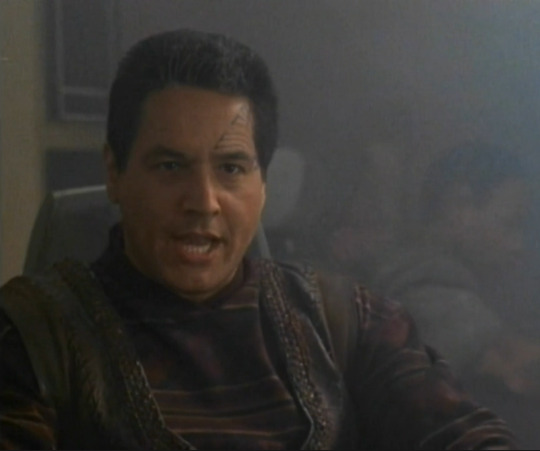
Fire! Raise shields! And somebody turn off that damned smoke machine!
As one would expect from a ragtag group of resourceful underdogs, the Maquis wear mismatched outfits made for trouble; we’re introduced to Chakotay and B’Elanna, both sporting rolled-up sleeves and tough leather vests.
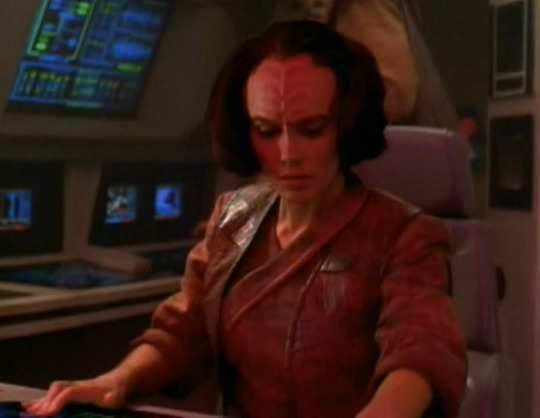
Forearms mean business.
Tuvok is here too, although we don’t get a good look at his outfit from any of the angles in this scene. Chakotay makes up for it, however, by giving us a bit of a catwalk look at his duds: the patterned shirt is lovely, and probably meant to evoke his Native American heritage.
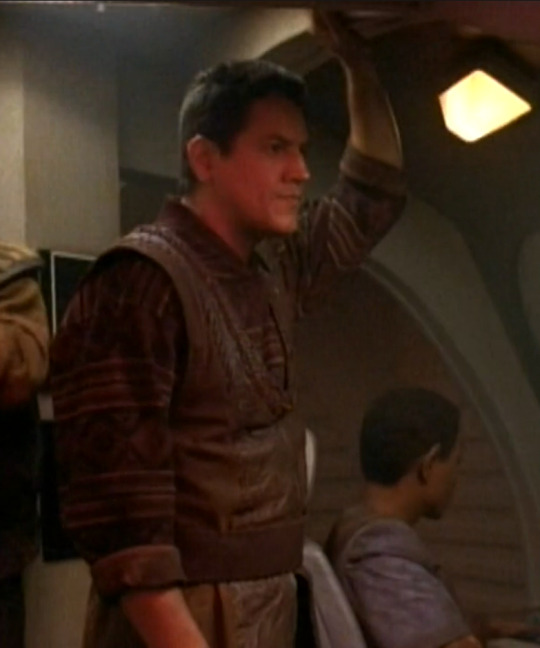
Actually, this may be the least problematic reference to his “heritage.”
Next, we’re taken to a sunny, verdant New Zealand penal colony, where Captain Janeway is busy picking out a boy toy. Unsurprisingly, we’re working with the same Starfleet uniforms currently in use on DS9, with a coloured section on the shoulders indicating department, and a grey turtleneck with rank pips underneath.
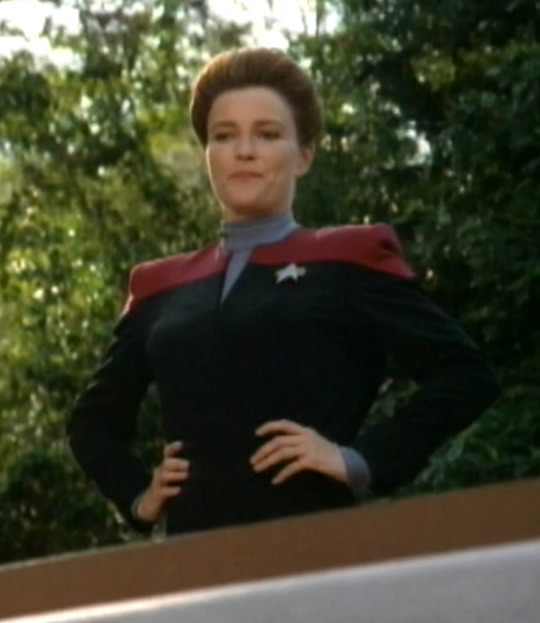
Get used to it – Voyager won’t be receiving wardrobe updates for about the next seven years.
Janeway finds the man she’s looking for – the boyishly handsome Nick Locarno Tom Paris – and hands him a “get out of jail free” card in the form of an invitation to join her crew. Tom considers her offer, weighing the excitement of adventure against having to give up his stylish prison coverall; the garment is concrete grey, with subtle shade differences across the chest and shoulders, not unlike a Starfleet uniform. I appreciate the asymmetry of the dark grey extending down the left sleeve, but not the right. The flap closure at the front is a little bit sexy, too, and along with the rolled-up sleeves, gives a “greasemonkey” vibe we’ll come to see a lot of from Tom.
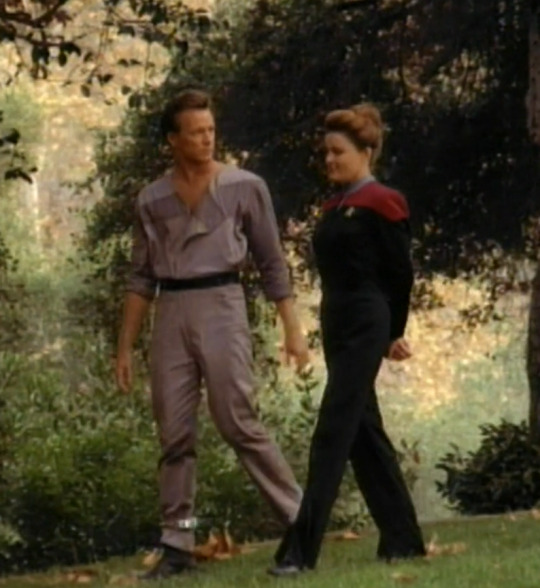
The ankle monitor makes a nice accessory, too.
Meanwhile, Voyager is docked at Deep Space Nine, and we cut to a character we all know and love: Quark! …In the process of ripping off young Harry Kim. Although Quark’s ensemble technically belongs to another show, I still have to award it “best outfit” for the episode. The matching teal hues in the pants, shirt, and jacket is a beautiful bit of coordination, and it’s obvious the costume department has had a few seasons to perfect the character design. It’s not unusual for a Ferengi to dress so lavishly, but Harry should probably take it as a warning sign that he’s about to be ripped off.
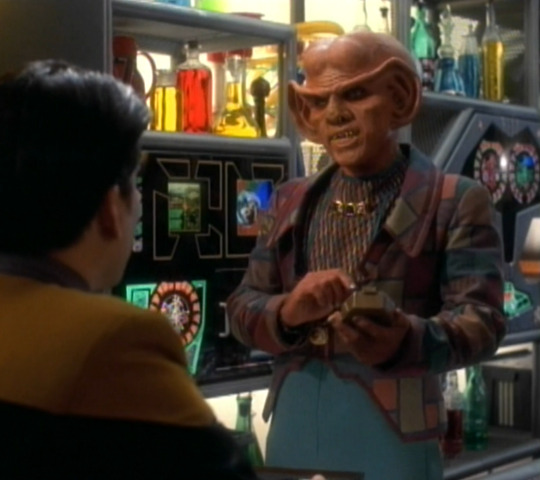
I’m sure he’ll be fine.
Up on the ship, Janeway has a chat with her fiancé Mark, who’s sporting a handsome wool-looking jacket in a dark mustard colour. Mark only gets about six lines and thirty seconds of screen time, so his outfit has to really pull its weight here building a character: handsome but approachable, smart but unpretentious, still shops at GAP in his 50s.
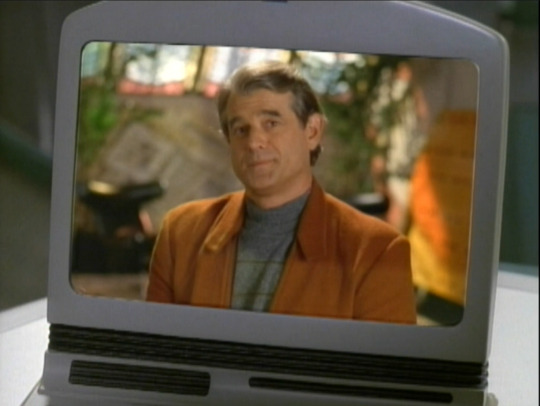
Sensible. I meant sensible.
There are no new costumes for a while as we meet the ship and crew, but we do get a few nice close-ups of Janeway’s lovely, elaborate updo – a more complicated style than the “bun of steel” she’ll wear in coming episodes.
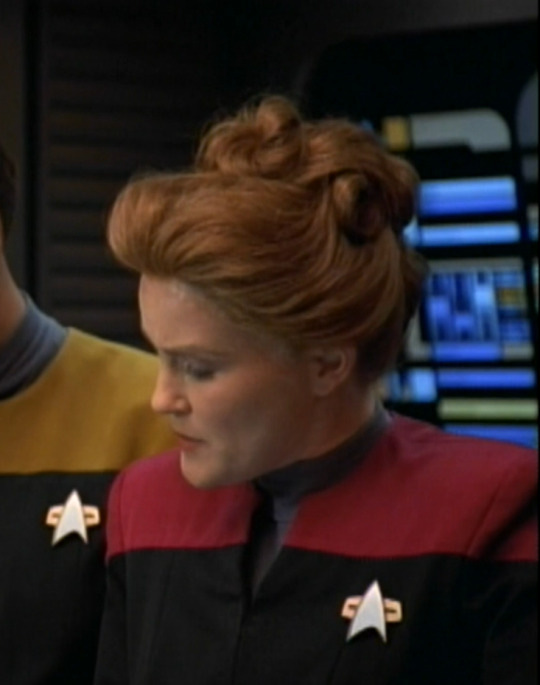
Ignore the wig glue. It’s just… space sweat.
I suspect the stylist wanted all those extra swirlies in there because, once the action begins and our crew gets roughed up a bit, Action-Tousled Janeway looks amazing.
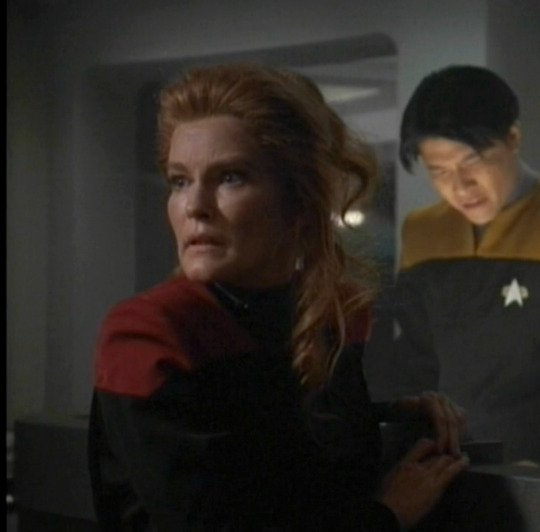
Slay, girl.
Harry and Tom go to sickbay, which is going to be full of patients very soon, and is also on fire. It’s hard to get a good look, but Harry puts on a cool Starfleet-issue oven mitt with metallic fabric to extinguish the fire.
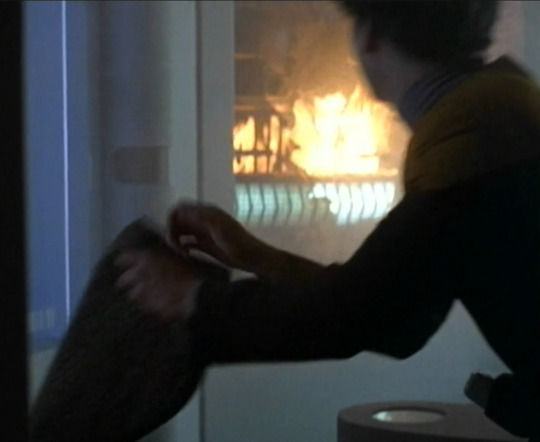
Was that hole always there?
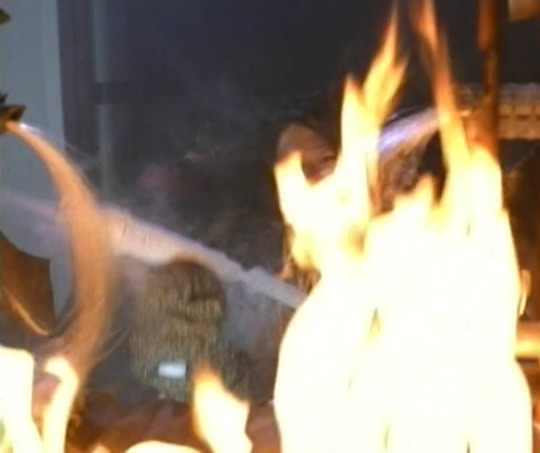
The least visible costume prop of all time.
In all the commotion, the crew realizes they’ve been zooped across the galaxy – 75,000 lightyears from home. But just when you thought we’d be stuck on a spaceship with one set of clothes for the next seventy years, we’re zooped again… to a southern country farm?! It looks exactly like Earth, and what looks like a perfectly human grandma comes out with cookies and lemonade to greet Janeway and co.
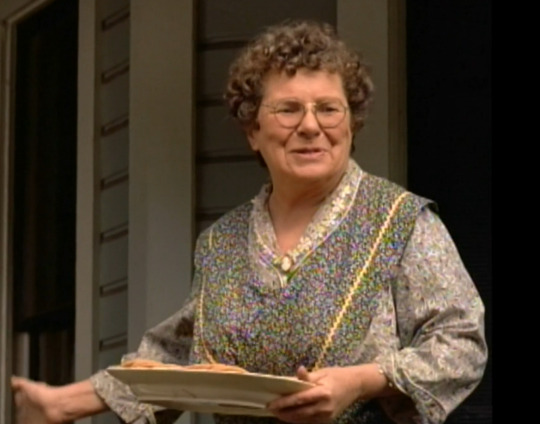
Floral fabric, ivory cameo, plate of cookies… yep, that’s a grandma.
She’s not alone, and soon the farm is full of completely “normal” “humans” having a good time, dancing and playing music. It’s literally the friendliest alien welcome party in history, but the Voyager crew are spooked. Moreover, they seem confused by the folksy straw hats and denim overalls.
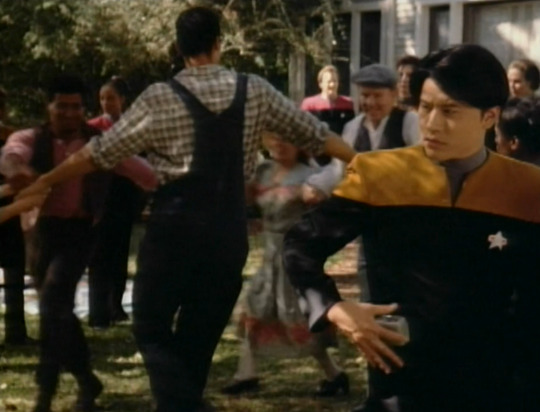
Highly suspicious flannel.
With one exception: Tom Paris has quickly made friends with one of the illusory farm girls, a young woman in a cute printed dress with a belt, mary janes, and bright white ankle socks.
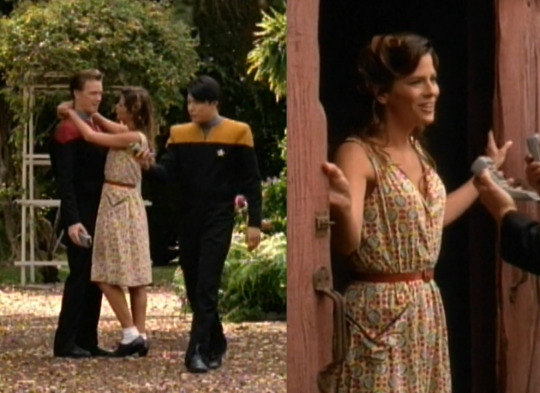
First contact: cottagecore edition.
However, Paris’ new friend gets a bit upset when they turn down her extremely tempting offers of a “real private” root cellar, a duck pond, and deviled eggs, and suddenly the farm folk aren’t so welcoming. The crew is zooped back to the ship – mostly. Harry Kim is missing.
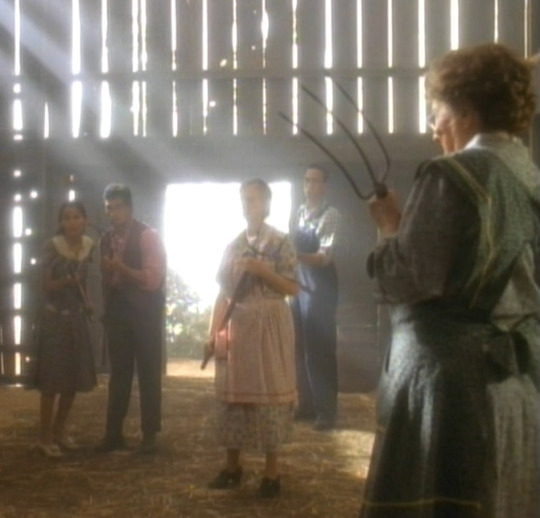
Get outta here! And take your synthetic fabrics with you!
Discovering a similar absence on the Maquis ship – B’Elanna is also missing – the two crews decide to work together to track down their people.
As they discuss plans, we finally get a good look at Tuvok’s Maquis disguise: he wears a cropped, open jacket made from a textured brown-green fabric, with sleeves in a lovely deep blue. The trim between the different fabrics is subtly shiny, giving the impression of leather straps. More importantly though, he wears an orange shirt underneath that appears to be stained at the collar – is that greenish hue Vulcan blood??
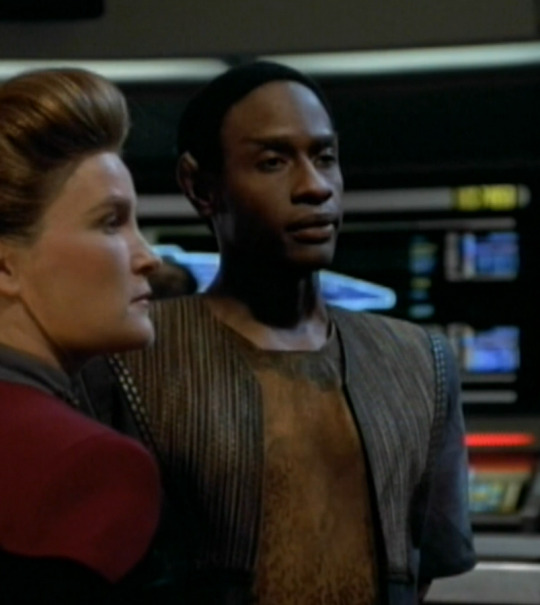
What happened to you in the Maquis, Tuvok?!
The episode isn’t out of costumes for us yet, though, and it’s a hard pivot from the dirty, worn-in clothes of the Maquis – as the viewpoint switches to that of our missing crewmembers, we find them in white clothing that resembles hospital gowns, albeit with an awkward strap closure that goes all the way around the back.
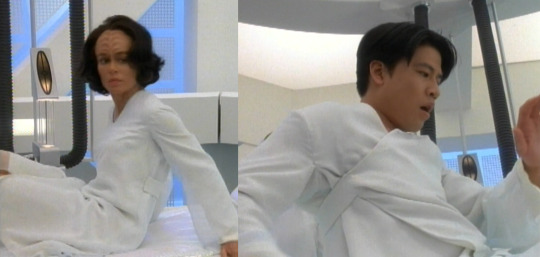
You know that strap has come undone and dipped in the toilet at LEAST once.
We also get our first look at the Ocampa, who at the moment are also clad in white, gauzy outfits. Unlike the “patients,” they wear strange fruit-netting-ish infinity scarves around their neck and head.
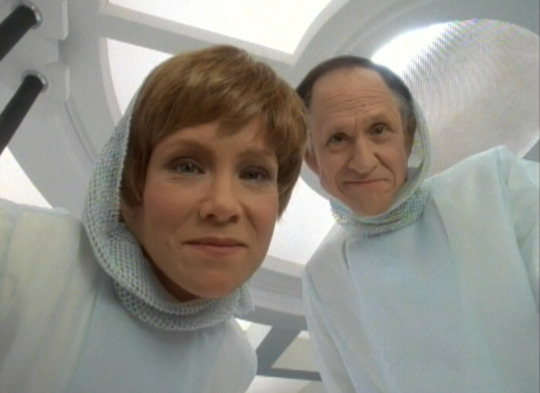
Keeps their melon safe.
The mesh fabric looks like it might be some kind of protective gear, but no, as we explore more of the compound, we see the truth: Ocampans just don’t know how to wear a scarf.
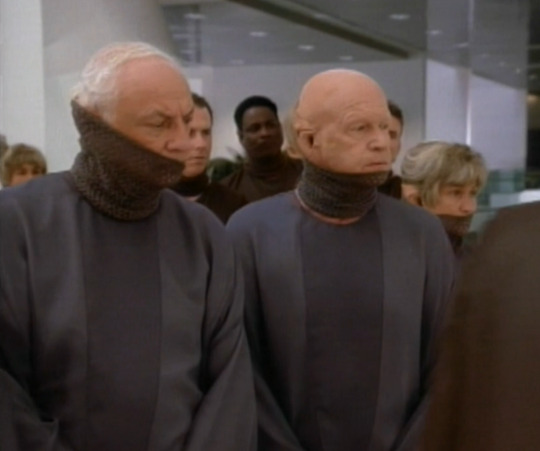
So close…
9 notes
·
View notes
Text
Voyager Crew as Hogwarts Houses
Janeway: Ravenclaw, because she has a passion for the pursuit of knowledge and she was originally a science officer.
Chakotay: Gryffindor, because he's not afraid to do what he thinks is right. He's brave in both his work and his friendships.
Tuvok: Hufflepuff, he works hard not just out of his curiosity, but also out of his love for his Voyager family. He is unemotional and logical, yet cares deeply about the crew and will do anything he can to keep them same.
EMH: Slytherin, he knows he's a hologram and rather than feeling limited, he strives to reach the highest level of excellence possible. He's innovative and ambitious, taking pride in his accomplishments and dreams. Deep down however, he really cares about how everyone views him.
Tom Paris: Gryffindor, he does what he knows is the right thing to do, even if it gets him in trouble. To him, laws are suggestions and prison is a temporary problem
Harry Kim: Slytherin, okay hear me out. He's wildly ambitious and that is his flaw. He pushes himself to the limit and wants recognition and accolades more than anything. He takes pride in everything he does and is overjoyed when given a leadership opportunity.
B'Elanna: Hufflepuff, plain and simple. She's hardworking, always putting the crew before herself. Everyone knows where her loyalties lie and she knows how to fix her past mistakes.
Seven of Nine: Ravenclaw, she spends all her time exploring and gaining knowledge. Exploring the Delta Quadrant, yes, but also exploring humanity and what it means to be part of a family
#star trek#voyager#uss voyager#captain janeway#kathryn janeway#chakotay#tuvok#emh#emergency medical hologram#tom paris#harry kim#b'elanna torres#seven of nine
89 notes
·
View notes
Text
I know no one is reading this madness but... I just have to scream about the Tom Paris x Harry Kim subtext...
Timeless
Writers gave us two KimRis parallels...
First... Janeway asking Chakotay to have dinner with her. (With romantic hints all over)
While this was happening, Tom and Harry were close with each other. And Harry ends up gesturing to his best buddy platonic friend. It means. Writers showed us TWO RELATIONSHIPS in the past.
Then... Present... Chakotay had a new love and he was willing to not change the past to stay with this new lover...
Oh man, he changed Janeway for that girl, even when the producers made him stare longingly and sadly at our Captain. (Once when she asked Chakotay to dinner with her and the second time when she was dead and frozen on the bridge).
But... Why Harry hadn't doubts about turning back time??? Okay, we could think GUILT! REGRETS!
But because he mentioned they lost THE PEOPLE THEY LOVED... And he was willing to die for them... And he wouldn't change his mind... And they put that parallel with J/C... I will conclude, yeah, he was doing this because he wouldn't change ANYONE IN HIS FUTURE FOR HIS JUST PLANOTIC BUDDY TOM.
Now, the message Harry o himself to repair his mistake... Is linked to Tom Paris's letter to his father. Or how I like to call it, the letter he wrote for his own growth.
30 Days
Even when we got another rewind in Tom Paris career... From Lieutenant to Ensign, this episode represented again his huge issues with his father but it talked about what's inside Tom.
I'm gonna divide this insights in two parts.
Tom's Fantasy World: Captain Proton
Something that could start like a game, was playing a very important part of Tom inner thoughts.
The whole adventure of Captain Proton resume Tom's fantasies and deeper desires. Because deep inside Tom wants to save the day and be a hero. He needs to proof he is worthy by being a superhero. But mostly, he is always saving the girl in danger. And when I say the girl in danger, I'm talking about Harry. Because Harry represents the imposible love interest he wants to reach. In this episode he arrives to save Harry again but this time from the evil Delaney's twins. But Harry shows him he wanted more time with the evil girls. (Imagine Tom trying to save Harry from women just to show him that he should be his only hero in that story, in his fantasy.)
When they go out from the Holodeck, Paris talks again about the letters... (Because they're trying to fix the letters they got, one of them is Paris's father letter)
PARIS: Any progress on those starcharts?
MEGAN: I'll have them to you by fourteen hundred.
The fact that Paris is bringing back that to us is because again, something very meaningful related to his father will happen. Because this evil letter made his character to go backwards in his behavior. Remember?
But then... Look at this:
PARIS: I think Jenny really likes you.
KIM: Yeah, I know.
PARIS: I thought the feeling was mutual.
KIM: How many times do I have to tell you? I like Megan, but she won't give me the time of day.
PARIS: What is the difference?
KIM: You can't be serious.
PARIS: They're the Delaney sisters, Harry. They're twins.
KIM: Are you kidding? They're nothing alike. Jenny's aggressive and sometimes annoying. But Megan, she's quiet, artistic, and she's got that cute little dimple in her right cheek.
PARIS: Jenny doesn't have the dimple?
KIM: No dimple.
Okay, I will stop here. Pay attention to this because I'm in awe here of the amount of subtext: THIS IS A LOVE TRIANGLE AND IS A BLATANT REPRESENTATION OF B'ELANNA->TOM->HARRY.
Tom tried to show a point to Harry because Delaney's sisters, here representing women, are the same to him BECAUSE HE WANTS TO SHOW HIS FRIEND WOMEN ARE THE SAME. SHOULD HARRY TASTE THE RAINBOW THEN? 😂
And because is a Tom's episode, is Tom centric so... Jenny is B'elanna, because she's aggressive and sometimes annoying. Harry is Tom here, because B'elanna likes him. But Harry/Tom is in love with Megan, because Megan is quiet, artistic, and she's got that cute little dimple in her right cheek. This is screaming HARRY all over even the dimple!!!!
Gif credit @skjc-writes
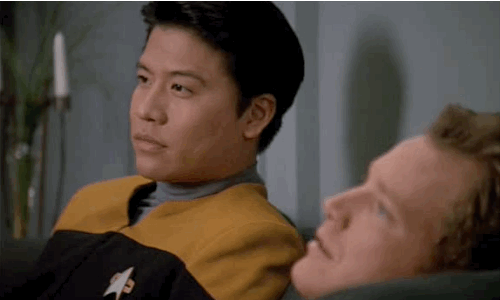
But the sad thing here is Harry saying IS AN UNREQUITED LOVE. And then Tom adding this...
PARIS: Well, you've done it again, Harry.
KIM: What?
PARIS: Fallen for the unattainable woman. First it was a hologram, then a Borg, and now the wrong twin.
I'm screaming here!!!! Because HARRY IS UNANTTAINABLE TO TOM!!!!!! ARE YOU READING THISS?? Of course no, I'm alone here, but, nevermind. 😂
Deep Inside Tom's Ocean
Another huge symbolism was the ocean planet and how they needed to go deeper to find the truth about the instability of that world.
The Ocean was a symbolic representation of Paris. We had a whole world installed almost in the surface of the waters that was about to fall down. It was an entire society.
When Tom decides to go deeper, they found another contractions that belonged to an older society who had lived there before. But... What was there wasn't the source of their incoming destruction. The new society was the one carving their own graves.
How we could read this related to Paris? Well, as I said, imagine the ocean is Tom. The society and buildings that are next to the surface is the self-destructive personality Tom had created in order to face his failures in trying to fulfill his father's expectations.
The old society buried in the bottom of the ocean is his true self. He's sensitive, and creative, and innocent like a child. But he abandoned that purity to build the surface. Because his true feelings wouldn't be accepted by his father. (This include his bisexuality).
Throughout the whole episode they repeat that the old society in the bottom of the sea IS NOT GUILTY for the incoming destruction. So, Tom's deepest feelings and thoughts and fantasies, what he really is, is not the cause of his self destruction.
The bad people here is the new society, that fake shield Tom had built for years to carry his low self esteem created by his incapability of fulfill his father's expectations. It's a self-destructive personality and is not who he really is.
The bad thing is, Tom is trying to destroy it, but Janeway blocked him. He couldn't... And he is still in his emotional prison.
Finish the Letter.
Tom starts recording a message to his father. It starts as if he was apologizing, but it will end as a compilation of his true desires. He wants to fight for what he feels is worthy. And sometimes you just have to take the risk.
The fact that Harry went to see him and not B'elanna is very meaningful and it shows why is Paris pining for him more than for B'elanna. But it also shows why Paris feels Harry is the unattainable love for him. And it show in the fact that Tom was avoiding Harry's eyes. He felt ashamed. He was ashamed of the man his friend had to see. His rank had been lowered. He was in prison again. Even after confessing behind the mask of a fantastic adventure of a ship that Harry was his NUMBER ONE.
He was feeling again he didn't deserve Harry he didn't deserve to be visited by him. He even let his self destructive personality to show again, but Harry, with eyes full of pain, gives Paris an advice that will close some of his wounds.
Harry is the one waking him up from the nightmare of deception. That's a huge symbolism because even with Harry there, bringing him back to reality, Tom will relate that with the fact that he feels he left down Harry too.
Harry asks Tom to finish his letter. To start healing that huge damage he has inside, the voice of his father yelling at him to do this and that, to be better. To not be what he wanted to be.
Finish the Letter for his father, because it will help him. Even if his father never hear it. Tom did it. He finished the letter. And then in his fantastic world of Captain Proton B'elanna repeats those words to him he really needs to hear from his father: I'm proud of you.
He has a long way to walk through. But it caught my attention that in season 5 we are still stuck in this matter. He should be showing more growth as a character. We are swimming in the same daddy issue and I suspect we will be swimming for a long time too.
I think the writers doesn't know what 'move on' means.
Miscellaneous: Megan and Harry mentioned to Tom the number 14 like something he needed to reach. (The remaining time to know about the letters and to get out from prison) This number represents EQUILIBRIUM and also LOVE. Maybe are those the two things Tom needs to achieve. Mostly, self love and acceptance.
Another interesting fact was the episode in which Seven said Tom got out from the cryogenic bed 4 TIMES. I'm thinking that maybe is related to everytime Tom had been in prison. We are counting three times so far. Let's see 😂.
#st voy#kimris#kimris meta#sta voy meta#star trek voyager#tom paris#harry kim#harry kim x tom paris#homoerotic subtext#star trek meta
7 notes
·
View notes
Text
Magic Voyager Bus
Should I be able to get the idea of Starfleet Captain Frizzle out of my head after this image put it in there? Yes.
Have I? That would be a no.
So, here is my who’s who list in a mashup of The Magic School Bus and Star Trek: Voyager, which absolutely no one asked for:
Ms. Frizzle: Tuvok - Obviously. Eldest of the bunch, has a stockpile of advice and knowledge, and is Vulcan-ly predisposed to keep his head when all about are losing theirs. Plus, the class is always poised between joy and terror at the suggestion of a field trip, which is pretty much how Tuvok’s suggestions are greeted on Voyager.
Dorothy Ann (DA): Kathryn Janeway - Her catch phrase is ‘according to my research,’ which pretty much says everything that needs to be said. She is also ready to throw down for science and starts an episode-long feud because she thinks friction is cool. Very on brand.
Tim: Chakotay - The artist of the group! He makes drawings and maps of their adventures, generally only speaks when he has an astute observation or good quip, and is a chill dude in a group that has very little chill. Our classic Commander.
Arnold: Harry - Has anyone ever summed up the essence of ‘I knew I should have stayed home today’ better than Harry Kim?
Carlos: Tom - My guy is famed for his endless (and I mean endless) series of puns for every situation. He doesn’t even have a catchphrase, because his catchphrase is everyone else going ‘CARLOS’ after he holds up a fossilized dinosaur egg and pronounces it ‘egg-cellent.’
Wanda: B’Elanna - Takes no prisoners, no objections, and sometimes no thought before her actions. She also has a streak going of getting her and Arnold into situations that they then have to bail themselves out of, which is the quintessential B’Elanna & Harry relationship.
Phoebe: Seven - ‘At my old school,’ is essentially the elementary school version of ‘when I was with the Borg’ and both are generally followed by a statement that describes a scenario vastly inferior to the one they’re now in. Yes, fine at your old school you were never shrunken down to explore the inside of your classmate’s intestine - how is this a complaint?! But over time, they begin to realize that their new school/individuality isn’t so bad after all. Plus, you can’t beat the away missions. Also, she has a rocking pair of overall skorts that are such a statement.
Ralphie: The Doctor - Big talk, very timid action. Ralphie is the first to leap to a conclusion and also the first to hide behind the nearest rock. Sound like a certain holographic braveheart who tends to get nervous when he’s out of his comfort zone and/or he learns the latest danger can actually threaten his holographic life? Both are loyal and have good hearts, though, and always come through for their friends in the end.
Keesha: Kes - Smart, soft-spoken, and confident that she can think her way out of any problems. Give her a pair of pointy ears and the resemblance is uncanny.
Liz: Neelix - Not to make an assignment based solely on color palette, but Liz the Lizard and Neelix share a fondness for bright colors. Also, who else could be Ms. Frizzle/Tuvok’s right hand and occasional disaster? He keeps an eye out for the class, but occasionally the lack of opposable thumbs (or Starfleet rank) can be kind of a limitation.
#i'm guessing the intersection of interest in voyager and the magic school bus is going to be low#but this has been sitting in my brain for DAYS#i need to inflict it upon the world to get it out of there#if you have opinions i want to know them!#(please don't leave me alone here with my weird brain)#star trek voyager#the magic school bus
2 notes
·
View notes
Text
Transcript - 70. Clinton-Era Star Trek
Liz: And why are we passing up an opportunity to criticize Rick Berman? We love that shit!
Anika: Let's always criticize Rick. Definitely everything wrong is Rick Berman.
You can listen to the original episode here.
Anika: Welcome to Antimatter Pod, a Star Trek podcast where we discuss fashion, feminism, subtext and subspace, hosted by Anika and Liz, and Cali the cat. This week we're discussing the pilot episode of Star Trek Voyager, "Caretaker".
Liz: So it's the 35th anniversary or something. No, that cannot possibly be it. 25th?
Anika: 30th. 30, isn't it?
Liz: No, I was thirteen when I first saw it, and I'm thirty-eight going on thirty-nine. So it's got to be the 20th. Right? No, 25th...
Anika: No, it's definitely not -- um, it could be 25th. Because the 20th, I did a panel for the 20th. And that was probably five or six years ago?
Liz: I feel like 1996 plus 25 might be 2021?
Anika: I don't know! Math!
Liz: Welcome to Antimatter Pod, the podcast where we don't do maths.
It's the 25th anniversary of "Caretaker", and I'm really really curious to know, when was the first time you watched it?
Anika: I don't remember! I remember watching "Emissary". I did not see "Encounter at Farpoint" first, I saw it, years after having seen Next Generation.
Liz: Which is really the way to do it.
Anika: Yes. And Enterprise, also, I have no actual memory of watching the pilot, but I probably did. I probably watched Voyager and Enterprise live, but I don't actually have a good handle on it. If it was 1995, I was -- yeah, I didn't have a Star Trek group at that point. I was in college, you know, so I was, like, making new friends.
Liz: You weren't ready to unleash the full force of your geekiness?
Anika: Yup. I mean, I was a ridiculous person, you know, there's no way that I wouldn't have been known as a geek by pretty much everyone.
Liz: I actually have very vivid memories of the first time I watched "Caretaker", because I received it on VHS as a Christmas present the year I was thirteen. I really remember how much I liked Janeway, and I wished -- like Kate Mulgrew has a very unusual voice, and that was sort of everyone in the family's reaction. And I'm like, Yeah, it's a weird voice, but I love her, shut up.
And the next day my parents' marriage ended, so...
Anika: Wow. Okay!
Liz: I don't think these things are really connected. But in my mind, and in my heart, they very much are.
Star Trek wasn't really my main fandom at the time. TNG had ended, and I was very deep into having feelings about seaQuest DSV. So -- there are probably still dozens of us.
Anika: I loved that show.
Liz: It was so great. We could talk about my OTP for seaQuest next. But yeah, that was my first encounter with Voyager, and I didn't really become a capital letters Voyager Fan until a few months later, when we accidentally got season two videos.
Anika: Accidentally. Yeah, I don't know. It's a good pilot episode. Not a good episode.
Liz: I want you to expand on that.
Anika: So the thing about pilots is, there are very few good ones out there. It's really hard to introduce a show in a way that isn't cliched, and isn't, like, a bunch of people expositing about everything you need to know about them to each other. It's a -- it's hard. It's hard to do it well.
Liz: Yes. If you want to see a bad pilot, I highly recommend the pilot for Babylon 5. It is unwatchably bad.
Anika: Voyager still has plenty of pilot problems, like, "Caretaker" still has plenty of pilot problems, but they cover a huge amount of ground. They introduce so many things, and when you think about all of the stuff that has to happen in this episode versus, say, "Encounter at Farpoint", which is really just a bunch of people introducing themselves to each other -- that's literally all that happens in "Encounter at Farpoint".
Liz: And not even by name.
Anika: And then Riker watches what happened in the opening scene? I mean, that is a terrible, terrible pilot, and a terrible episode.
Liz: My friend and their partner have decided to start with Star Trek at "Encounter at Farpoint". And I'm like, I love you. You are good people. You don't deserve this.
Anika: Don't do it! No.
But -- so what I like about "Caretaker" is that everyone except B'Elanna -- and I will tell you more about that in a little bit. But everyone except B'Elanna has an introduction that is not them introducing themselves to each other. Or to the audience. They don't stand and say, "Hello, I am Harry Kim."
There's like little bits and pieces, like the -- what we learned about Harry Kim is what Janeway says about him to Tuvok, you know. What we learn about Tom Paris is that, you know, he's in prison. And the first time we see Janeway is Tom looking up at her, and it pans up and she's got her hands on her hips. And she's like, "Hey, I'm totally in charge, and I'm here with Obi Wan Kenobi to rescue you."
So it does pilot things. We get that there is tension between everyone and Tom Paris, like, literally everyone and Tom Paris, there is tension. And we get that there is tension between the Maquis and the Starfleet people, we get that Janeway and Tuvok have a very close, established relationship. Like, there's a lot of established stuff going on?
The Janeway and Tuvok stuff is so much better than the Picard and Crusher stuff, like, I can't even -- they're worlds apart in terms of how they play.
Liz: And not just because the language of setting up a platonic friendship between a man and a woman is different from setting up a romantic tension. Seven years have passed, and the writing is different. And Janeway -- the woman is the one in a dominant position. And it's just better.
Anika: It's just better, it's just better. But the actual story is not. Like, the whole Caretaker thing, it's clearly a plot device, it's very deus ex machina for "we have to get them lost in the Delta Quadrant. Like, we have to get them to the Delta Quadrant, and then we have to get them lost here."
And so, while it is entirely Janeway's choice, she's the only one with agency. She takes it away from everyone else. There's no meeting to discuss any of these things. And it's all very driven by this "there was, a guy, an ancient guy who, like, steals people and keeps them as pets. And his favorite people, like, he needs to" -- it's just ridiculous. Like, he's seeding himself so that someone -- so his child will be stuck with this horrible job of taking care of his ant farm of Ocampa.
Everything about it is bad. Like, nothing in that whole story is good. He's a bad person. And it's so wildly ridiculous. Like, he dies before they can even begin to understand how any of it happened? Like, they just blow up the array?
Liz: It's sort of like the writers going, "Oh, shit, we really don't want to ask too many questions about this guy, we'd better kill him as fast as we can."
Anika: Exactly. So. So if you start to think about this story at all… Being a pilot that introduces you to these characters and this situation, it's bad. But if you're just watching to be introduced to these characters and this situation, it's good.
Liz: I have never thought about it in those terms until you said this in our preparation, but I think that's a really, really good point.
And I'm going to confess that I have not re-watched "Caretaker" to prepare for this episode because I have seen it so many times, I can quote big chunks of it by heart. And, honestly, it's actually not that rewatchable. Deep Space Nine is not my favorite Trek, but I have seen "Emissary" so many times, and I enjoy it every single time. After a while, watching "Caretaker" starts to feel like a chore.
Anika: Yeah, because what's actually happening is not interesting.
Liz: Yeah, yeah.
Anika: And it's just full of holes, and I just get mad at everybody if I start thinking about it.
Liz: That's before we get into the bit where the Kazon exist.
Anika: Oh, the Kazon. They tried so hard to make the Kazon happen. And it just never happened.
Liz: Re-watching season two for my blog, I was struck by the fact that, with a different writing team, the Kazon could have been really fascinating and nuanced and interesting. And instead, it's basically white people having a moral panic about Black people. You know, they explicitly said that the Kazon were, like, "They're based on East Los Angeles area gangs!" And I'm like, Sure, okay. That's potentially interesting, but you're all white people. And, you know, we find out that thirty years ago, they freed themselves from slavery. And that's why the--
Anika: Thirty years!
Liz: I know! I know! That is my own lifetime! [But] that's why they're low tech and dysfunctional and desperate. And they're not given even an ounce of empathy, or sympathy, or even consideration. Even "Initiations", which I think is a good episode, and certainly, by far the best Kazon episode, there's just -- there's one good Kazon, and that's it.
And I do think part of the problem is that we never see their women, we never see them in any situation other than hostility. But mostly, I think the problem is that the writers are racist.
Anika: And the one good Kazon is a kid.
Liz: Yeah, yes.
Anika: It's almost like it's like a white savior -- or a Chakotay savior story, you know, like, Dangerous Minds--
Liz: Yeah.
Anika: -- where Michelle Pfeiffer goes into the inner city to save it.
Liz: The mental image of Chakotay as Michelle Pfeiffer is amazing. And yeah, that is a really messed up genre, and the only good thing it ever gave us was "Gangsta's Paradise".
So, yeah, that limitation in the perception of the Kazon is built right there into this pilot. And a lot of people go, you know, "It's so stupid how they have spaceships and they don't make -- they can't replicate or create their own water." And it's like, this would have been a great opportunity to explain some of their history instead of going, "Surprise! It's actually really racist!" a season later.
Anika: Yep. It's just really bad. Everything's bad about the Kazon. They're not great. They're not good villains. And anything -- every time they are almost interesting, they're almost instantly not interesting and/or racist at the same time.
Liz: It troubles me that the series with the first female captain is also the first series where sexism and misogyny are treated as anything other than a joke. We've had the Ferengi for years, and it's always been, "Haha, they like women to be naked." And it's only now that suddenly these writers are forced to empathize with a female character, that they're like, "Oh, maybe that attitude is ... bad?"
Anika: Maybe it's bad. We never see a Kazon woman.
Liz: Right, are they living in -- is it a Kazon Handmaid's Tale thing? Or are they warriors in their own right? Do they have their own politics? Are they trying to pull the strings from the background and maybe doing so more successfully than Seska because they're further in the background? We don't know. We'll never know.
Are we the only people who look at Star Trek and go, but what if the Kazon came back?
Anika: So we're definitely the only people who look at Star Trek and think, what if the Kazon came back?
But Cullah was almost an interesting character. And, really, the most interesting he ever was was when he took the baby, and, like, cared. That he cared about any of that happening, that he cared about Seska dying. It was like, Oh, my gosh, this is a real relationship all of a sudden. So it's just interesting. And they had a lot of interesting Macbeth scenes that were fun, that could have been so much better if they'd leaned into that instead of what they did.
Liz: Yeah.
Anika: But we're we're getting beyond the scope, because we're supposed to be talking about "Caretaker", and Cullah is not even in it
Liz: Turns out we could do a whole episode on the Kazon
Anika: Whoops!
Liz: That's really gonna get the listeners.
Anika: Let's talk about our first impressions of the crew.
Liz: So the scene where Tom looks up, and there's Kathryn Janeway with her bun of steel and her hands on her hips, and, you know, in her very first scene, she tells us that she was a scientist before she was a captain. I fell in love.
And yet, the pilot is really eager to tell us that just because she's a woman in command doesn't mean she's ... not a woman.
Anika: She has the world's most boring fiance.
Liz: Oh my God.
Anika: I hate -- like, my favorite part is that they're talking, they're facetiming on the viewscreen and all, and she's lliterally doing work while talking to him. Like, this is the last -- and they don't know that it's gonna be the last time for seven years, or whatever, but it's still gonna be months. And yet, she's just doing her work, and he has to tell her to look at him, which is hilarious. But he's also -- he's so milquetoast, I don't care.
Liz: He's just sort of your standard extruded Star Trek male love interest.
Anika: And then there's puppies. She loves her dog.
Liz: She loves her dog. She likes to be called ma'am rather than sir. It's a very 1990s "don't be too threatened" scenario, which is interesting, because you contrast that with Major Kira, who, I think, as the second lead, rather than the primary lead of the show, has more freedom to be abrasive, and unlikable, and unfeminine.
Anika: Yeah. But even in Deep Space Nine, like, Jadzia is super feminine. In presentation, at least, and the more it goes on, she gets -- the more they were like, "Don't worry, we also have this pretty one." Like, Nana Visitor is gorgeous, just, you know, don't yell at me. But--
Liz: After the pilot episode, she went and cut off her hair into -- it's not even a pixie cut. It's a really butch style. And she did that without getting the permission of the producers. She was just, like, that's how Major Kira would have her hair.
And then, over the next seven seasons, they worked really, really hard to force Kira into a feminine mold.
Anika: You're right, they absolutely do it to Janeway [too]. She has that whole Jane Eyre holoprogram thing that -- everything she does in her free time is, like, from the 19th century. It's just very weird. She's super old fashioned in her forward thinking scientist future ladyness.
Liz: I think a lot of that is down to Jeri Taylor, and the fact that she was already, for the '90s, older than the generation of feminists who were defining the movement at the time. I realized once that she's only a year younger than DC Fontana.
Anika: It's interesting. Kate Mulgrew was forty when she started Voyager, but according to apocrypha, she was playing five years younger, like, she's not supposed to be forty.
Liz: No, I've heard that too, that Janeway was meant to be about thirty-five. Which, I mean, I guess? Maybe?
Anika: [What that] means is that she is admiral super young. That's what I take out of it. So good on her. It's just weird. It's like, why? I don't know. It's just very Hollywood. It's very, "Oh my gosh, we can't have a forty-something woman in a starring role. We can't possibly do that. So, okay, we got this one and, and we're gonna go with her, but she's not really forty. You can still be attracted to her. You're allowed, everybody."
Liz: You know, "We've got her in a corset so she's thin, and she's in high heels so she's tall and she'll walk in a sexy way."
It really struck me, the first time I watched Discovery, the first time I watched "The Vulcan Hello", how feminine and comfortable Michelle Yeoh looked with her hair in a ponytail -- and it's a very loose ponytail -- and she's wearing flats. I was like, Oh my god, this is what Janeway could have been.
Anika: Right.
Liz: Now, I know that the next character on our list is Chakotay, but I think we should talk about Tom, because he and Harry the POV characters for this pilot. It's sort of telling that Chakotay is sidelined from the beginning.
Anika: I always say that there are three co-protagonists in this pilot. Tom, Janeway, and Kes are the people who have a point of view and an arc.
Liz: Yeah, you're right.
Anika: And everybody else is just sort of in their orbit.
Liz: Even Kes barely has agency.
Anika: It's a giant cast, so they couldn't -- and again, B'Elanna is not -- like, the B'Elanna that I know and love is not in this pilot. She's just not even actually there. There is a B'Elanna in this pilot, but it is not even close to who she is. And she's barely on screen. She's just an angry Klingon lady, that's all she is.
Liz: Who almost flashes her whole boob in one scene.
Anika: But she immediately -- like, the very next episode is a B'Elanna episode. So it's sort of like, "We didn't put any effort into her in the pilot, because we're gonna, you know, we're gonna have a whole episode about her. It's gonna be okay." And it's great, "Parallax" is a way better story.
Liz: Yeah, I don't think that's necessarily a bad choice. That's like Discovery taking six episodes to introduce it's whole cast. And I think B'Elanna is better served by that, but it's interesting how objectified she is in this story.
Anika: Yes.
Liz: To get back to Tom, I listened to the Delta Fliers episode on "Caretaker" when it came out. I'm sort of at peak Star Trek podcast, so I've gotten behind on them. But that's Robert Duncan McNeill and Garrett Wang talking about their memories of each episode. And--
Anika: It's very fun.
Liz: --among the things that I enjoyed were Robert Duncan McNeill calling himself out for how sleazy Tom is towards women, particularly Janeway. But he blames himself and I'm like, I'm pretty sure you are following a script, dude. Like, this is not your responsibility.
But also, he says at one point that Tom Paris was considered as a potential love interest for Janeway, and that they were going to cast someone older for the role.
Anika: I've been saying that since the beginning. Janeway and Paris, as we all know, are my OTP of Voyager. And I'm not off that! I ship that! Like, I ship literally everything. But it's always going to be -- Janeway and Paris are going to be the most important to me, in terms of Voyager characters, just partly because, again, I was, what, 20? And I -- not even--
Liz: Yep.
Anika: It was formative, you know, it's like, I loved Voyager so much, and I loved Janeway and Paris. The first fan fiction that I read and wrote was Janeway and Paris. Iit's just gonna be them.
And so the idea that they were ever considered, quote, unquote, canon, it just makes me feel like I wasn't a crazy person reading into the entire first two seasons.
Liz: No.
Anika: I firmly believe that you can see a relationship behind the scenes in the -- you know, up until he starts having a thing with B'Elanna.
Liz: No, in fact, there's a point in season two where Robbie is like, "I think this is around the time they stopped pushing Janeway and Paris and started moving towards Janeway and Chakotay."
I found that really interesting, because the other thing that we know about the development of Voyager is that they always wanted a Nick Locarno type of character. They always wanted Robert Duncan McNeill in the role. And, honestly, that doesn't mean that they never considered casting someone older. We know that there were legal issues with having the Nick Locarno character, and that's why he's Tom Paris.
And, you know, it's like how they auditioned men for Janeway and women for Chakotay at one point. Like how DS9 auditioned white men for Sisko, you throw everything at the wall and see if it sticks. But I think the AU with an older Paris would have been interesting.
Anika: I'm fine with it as is. I like the ten-year age gap, personally, but I don't even mind -- I wouldn't mind the five-year if she's really thirty-five. Whatever, fine. Then we're closer to a five-year age gap. But I like the idea of her, like, meeting him when he was a kid and then forgetting that that happened.
Liz: Not giving him any thought, and then meeting him as an adult and going, oh.
Anika: "Whoa."
Liz: Yeah. That would have been really cool because it's a sort of borderline creepy storyline that we see a lot with men and younger women. And I don't remember ever seeing it with women and younger men. And I like an age gap, and I like a relationship where there -- there are problematic elements to be negotiated.
Anika: Yes, exactly. Oh, my favorite things.
Liz: But also I think Tom Paris in the pilot is a deeply terrible person, and I hate him.
Anika: Oh, yeah.
Liz: So many of my friends are watching Voyager for the first time and going, Wow, Tom Paris, he is the worst. And I'm like, Yeah, but wait a few seasons, he's going to be the suburban dad of everyone's, I don't want to say everyone's dreams, but he's going to be peak suburban nice dad. And it'll be great.
Anika: You said that Robbie says that he blamed himself for being skeezy -- see, I give Robbie all the credit for him not being skeezy. I'm on the other side, where I really feel like they tried, they tried to make Tom Paris that guy, the guy that I don't ever like and never want in my Star Trek, and they keep trying to put him in Star Trek. Like, every series has that guy. And it was Tom Paris.
And he was just not capable of playing it. He put so much warmth into these horrible lines and situations that you couldn't -- you couldn't read it that way. And so there was, like, oh, there's something deeper here, he's not just hitting on people, he's lonely. He's not just, like, he's not getting, you know, doing -- he's not trying to hit on the captain in her pool [game] or whatever, he's actually trying to make a friend. He's telling her that she matters to him because she's giving him these second chances.
I read all of my Janeway/Paris stuff into these early seasons where he has horrible storylines, because the actors aren't acting like he's a skeevy, horrible person.
Liz: No, and all of Tom's good qualities are -- or seem to be -- Robert Duncan McNeill's good qualities. You know, he's open, he's generous. He's kind of funny, kind of a dork, but self-aware about it, and very passionate about holding up the people that he loves. That seems to be Robert Duncan McNeill. And that is who Tom Paris becomes.
But I also think, like, what you were saying about how he's not flirting, he's trying to make friends, I also think that his background in terms of having neglectful and emotionally negligent parents, he needs people to like him. And if the only way he can do that is to make them attracted to him -- to build an attraction -- that's the strategy he'll use.
Anika: It's such a psychological thing that really happens, and again, often with women.
Liz: Yeah.
Anika: I gotta say, this might be a good place to say, where Voyager does an incredible job of giving all of the men various feminine traits or, like, you know, stereotypically woman-centered things that happen--
Liz: Right, right, Chakotay is sensitive and domestic. And Tuvok defines himself to a large degree by his parenthood, and Neelix is the cook, and the Doctor is a caretaker, and Harry -- with Harry, I feel like a lot of it's bound up in anti-Asian racism, to be honest, and the emasculation of Asian men. But he is another very sensitive and gentle guy who doesn't really like -- he likes to be romanced, he doesn't like to be seduced.
Anika: It's great. And then, you know, the women -- we get B'Elanna in the engineering role. And she's also angry all the time.
Liz: Yes.
Anika: And Janeway is a scientist and in charge, you know, she's the authority.
Liz: And Seven -- Seven, when she's comes, in is sort of her own thing altogether. But she's the Spock. She's the Odo. She's the Data. And it's notable that the most classically feminine of the characters is Kes, and she's the one who is treated as a failure and discarded and in the fourth season.
Anika: Yeah. They don't know how to write for her, is what it comes down to
Liz: I think it's that thing where they don't know how to empathize with women who don't act in some way, like men. And this is all very binary and very steeped in stereotypes and generalization.
Anika: But it's very '90s.
Liz: It is so '90s.
Anika:
I can say, as a child of the '90s -- I can still call myself that -- that it's what we were grappling with. Like, the '80s were -- there was this whole power fantasy stuff, right? And then the '90s were, you know, grunge and riot grrrls. And so there's just -- this show, like, yeah, it's using all those stereotypes, and so that's why I'm calling them feminine traits. I don't think that cooking or being a good parent or having soft hair or being a musician is feminine in any way.
Liz: No, but we are dealing in stereotypes.
Anika: It's gender coding. That's what I'm talking about.
Liz: Relatedly, one of the reasons Janeway's character is considered 'inconsistent', and I'm using air quotes because I don't think that's actually -- I don't think she's the worst in terms of inconsistent writing and Star Trek captains. But -- (Archer) -- but part of the reason for that--
Anika: My trash boy.
Liz: --is that all the writers had a different feminine stereotype or archetype in mind when they were writing Janeway. Some people saw her as a schoolmarm and Jeri Taylor saw her as an earth mother for some godforsaken unknown reason. And it seems like no one was really able to go, "Hey, what if we get past the stereotypes and archetypes and just write her as a ... person?"
Anika: It's just bad. And it's true. There are definitely inconsistencies where she -- the one that I always point out is that she has this super faith thing where she literally has a scene where she explains the concept of faith and God to Harry Kim. And then, a season later, she has to go save Kes from whatever horrible thing is holding Kes hostage.
Liz: And suddenly she's a TV atheist.
Anika: Yeah. And it's like, what are you talking about? That is not Janeway. It's just wrong. You can't have it both ways. And so there are inconsistencies.
I think you're right, that it's a problem with different people having -- like, putting different ideas of who Janeway is onto her.
Liz: And certainly, Archer is at his worst when they try and force him into an equally narrow masculine box.
Anika: Yeah. Right.
Liz: So, the patriarchy. It hurts men too!
Anika: But I do think that, yeah, Janeway isn't alone in her inconsistencies. And I also think, of every Star Trek character, or every captain, she has the most reason to be inconsistent.
Liz: One hundred percent. Because she's the only one--
Anika: She shouldn't be--
Liz: Yeah.
Anika: She shouldn't be consistent when she's holding the entire, like, the idea of Starfleet and the Federation herself. She's gluing it together in a place that doesn't know what any of those words even mean.
Liz: And she can never get a break. Picard can take a holiday and go to Risa, and wear skimpy shorts, and have a fling, and have adventures. Janeway has to do all that in the context of her ship.
Anika: Right. And she's always captain. She never gets to not be captain, even if she's in the holodeck hanging out.
Liz: Yeah. Basically, Voyager is 2020, and Janeway is working from home.
Anika: So I cut her a little slack.
Liz: Hah, I cut her a lot of slack.
Anika: And I write into my own little headcanons that it is all of this psychological stuff that she's dealing with. Uou know, I say, Oh, well, she was depressed then, so she was making these choices. So.
Liz: Honestly, Janeway makes sense to me. There are inconsistencies, but she holds -- like, she feels consistent emotionally. And that's what's important.
Anika: Right.
Liz: Let's talk about Chakotay, who you've described here as the most stereotypical Native character ever.
Anika: It's just really sad.
Liz: I -- yeah.
Anika: Like it's sad on every level, because now, creating a Native character now, which they should definitely do, but putting that character into Star Trek, that character automatically is stuck with the Chakotay baggage. And that's just so upsetting. We're never going to get this clean, quote unquote, Native character, because of this mess that we got with Chakotay, where he -- like, it was already bad, the TNG episode isn't any better. That episode is really bad.
Liz: That's the episode "Journey's End", which sets up either Chakotay's home planet or one very much like it, colonized by Native Americans, because that is absolutely how Indigenous people work.
Anika: So bad. And then they get kicked out, kind of like in Picard, you know, Starfleet's like, "You gotta leave now, because the Cardassians own this place." And it's like, but they don't really? And no one really does?
So, right, it puts them on the wrong -- it's just all it's all bad. It's all bad. And it's all very much a white person writing what they think an Indigenous person is.
Liz: Right.
Anika: All it did the dream watching, and--
Liz: The vision quest...
Anika: --none of it is true. That's where I end the sentence, none of it is true to the idea of an Indigenous character. And it's just it never gets good in Voyager. I want to like Chakotay, and I have troubles.
Liz: To their credit, they hired a consultant. Unfortunately, the consultant was a white fraud, a Native faker, who was already notorious for being a fake, and Native American groups had been warning Hollywood for years that he was actually a white guy. So they start off on a bad foot.
They audition a lot of Native American actors and decide they're too, quote unquote, on the nose, meaning too Native American. So they cast Robert Beltran, who is a very talented Mexican American actor, who doesn't seem to have any Native heritage. I don't know how Indigenous identity in Mexico works, but to my knowledge, he doesn't really participate in Native culture, or anything like that. So, yeah, they just went for the nearest brown guy, basically.
Anika: And the thing is, if he was Mexican American, and not Native, that would be better,
Liz: Right, or just a Mexican American character who has some Native heritage that he is learning about, like, that is a really interesting story. But like, so much of it is dated even for 1996.
Anika: Right. That's right, exactly.
Liz: I remember as a kid cringing every time they use the word Indian, because even then I knew that the new and appropriate term was Native American. And just the whole "I hear in some tribes, if I save your life, you belong to me" -- that's a setup for a slash fic. It shouldn't be canonical.
Anika: Yeah, everything about poor Chakotay is poorly done. And the further we get from Voyager, like, the more time goes on, the -- [it gets] more blatantly bad. It really starts to stick out.
Liz: I understand what you're saying, that everything they do from now is tainted by what they did with Chakotay. But I really do think that new Trek, the Trek Renaissance, needs Indigenous representation.
Anika: They should definitely do it.
Liz: Yeah, like Discovery films in Toronto and there is no shortage of hugely talented Native Canadian -- I think it's Canadian Aboriginal? Of Indigenous Canadian actors. And and, obviously, Evan Evagora in Picard is half-Maori ... but he's playing a Romulan, so.
Anika: I'm not saying they shouldn't do it because of all this baggage. I just feel sorry for the actor.
Liz: Yes.
Anika: I feel badly for the person who has to deal with it.
Liz: Also because they're inevitably going to end up on panels with Robert Beltran, and honestly, he seems like a dick.
Anika: Everything I've seen of Robert Beltran has been very, like, dismissive, I guess, is the best way -- like, when people bring up to him that, you know, maybe it wasn't the best representation of an Indigenous population, he sort of gets defensive and doesn't listen.
Liz: Yeah.
So let's move on to the greatest character in all of Star Trek...
Anika: Tuvok?!
Liz: Tuvok! Yes.
Anika: I have a Tuvok standee in my house now. I love it. It's just -- Tuvok is amazing. Best Vulcan by far.
Liz: Yes.
Anika: His relationship with Janeway is so precious to me. I just love everything about it. I love how warm it is right off from the beginning. I love that he is just as -- he does crazy stuff for Janeway, the way that Kirk does crazy stuff for Spock. It's that same level of "that's insane," and I love that. I love that they have that relationship. And I'm forever sad that they are the least represented in fan fiction. Like, even, like, platonic. I'm not saying -- I do, I would ship them. But...
Liz: But we don't even have fic about them having adventures.
Anika: Right? There's just -- I mean, Tuvok, yes, best character in Trek. Chemistry with everyone is highly -- [but] he's the least represented in Voyager. It's very upsetting to me because it cannot not be racism. There's just -- I don't have another explanation for why Tuvok is so ignored.
Liz: I have a theory, but I think the primary reason is indeed racism. But I also think it's that Tuvok enters the series as a man who already knows who he is, and his regrets are mainly behind him, and he doesn't really change much over the course of the series, save that he unbends to an extent to reveal his affection more than he did at the start. But, on the whole, he's not the most dynamic character.
And I love that about him! I love his stability, I love the respect that he has for everyone, even Neelix, who often doesn't deserve it. And I think he is a character who is almost the heart and soul of the show in a way that's easily overlooked because he is entertaining and fun to watch with every single other regular character.
When I put it like that, the only reason he is overlooked -- aside from -- like, I really do think a lot of it comes down to racism
Anika: Yeah, he absolutely is stable. And he absolutely does -- he's a supporting character in every way? He supports, but it's sort of like, so shouldn't he be supporting people? Can't we still write fic about that? I don't understand.
Liz: Now I'm thinking that if he was a white guy, he would probably be the male bicycle of the cast. Like I realized the entire cast minus Neelix is basically the bicycle, but now I'm side-eyeing fandom extra hard.
Anika: I just love Tuvok so much. And I have written Tuvok, but I've definitely written for January and Paris. So I'm also part of the problem, I guess.
Liz: I will confess that I completely overlooked him until my current rewatch, so I am not excusing myself from anything here.
Anika: I try to give him, you know, his due, at least in my ensemble fic. I don't actually write much Voyager fic right now.
Liz: No, no. I haven't for years
Anika: And also T'Pel, too, I'm, like, on a mission to give T'Pel literally any characterization whatsoever.
Liz: Someone somewhere out there is going to write me a Janeway/Tuvok/T'Pel fic, and I'm going to be very grateful.
Anika: Nice.
Liz: We're almost at an hour. Let's talk about Harry Kim. Every time I watch "Caretaker", I'm blown away by how beautiful Garrett Wang is, and the floppiness of his perfect '90s non-threatening boy hair. It's magnificent.
Anika: That's absolutely true. One of my photo caps, he just has amazing hair. One shot, you know, my, like, tagline for Janeway is that her hair is fabulous. And I was like, Oh, HIS hair is fabulous, and I compared it to Poe Dameron.
Liz: Oh, no, you're not wrong. I said something in my "Q and the Gray" post about how the only redeeming feature of that episode was Harry's floppy hair. And then I mentioned that when I linked to it on Twitter, and Garrett Wang replied, and I -- I cannot be acknowledged by the actors in that way. Like, I want to objectify you, you don't get to respond. This is a one-way relationship.
Anika: Poor Harry Kim. Harry Kim is another one who is routinely overlooked by fandom. But unlike with Tuvok, there are like the rabid Harry Kim fans who will come to his defense and do write him, usually with Tom, but--
Liz: I understand that there is a thriving, powerful of Tom/Harry shippers, and I don't ship it, but I fully respect them.
Anika: And so he has his own little corner, I guess, of the fandom. But it is still true that, in wider fandom, if you're gonna ask non-Voyager fans -- but Trek fans -- they'll point out Harry Kim as a waste of space, that he has no characterization whatsoever--
Liz: Lies!
Anika: --that, literally all they know about him is that he was never promoted during the series. And it's just, it's gross.
Liz: Which is, again, racism.
Anika: Which is just really bad.
Liz: Because Rick Berman did not like Garret Wang.
Anika: Exactly. What I do when I'm watching Voyager, and I really saw it -- like, Voyager actually does a good job -- you know how we were always complaining about making the bridge crew annoyingly prominent in Discovery? Voyager does a really good job with their giant ensemble. And to be fair, they're all like actual regulars.
Liz: They are, which I do think was a mistake.
Anika: They're supposed to be prominent, but little things. Like there's this great part where we learn that Harry wears a mask to sleep, and why. And, of course, he has his clarinet and his love of music, that he, saved up replicator rations to make a clarinet because he left his actual one at home.
And he has his fiancee, and when he is in that little bubble reality where he's back on Earth, and he has like a favorite coffee place, and he has a favorite coffee order. And it's like, those are the details that I want. You know, they're like throwaway -- not important to the plot. They just tell you who Harry is.
Liz: And what he values.
Anika: And he's a really sweet guy that cares about community, and knows people's names, and pays attention to little things. I don't understand the criticism that Harry Kim doesn't have character, because he has so much character.
Liz: What I don't get is this idea that Harry Kim is bad with women. He is wildly successful with women. He just finds it uncomfortable when women come at him aggressively. Like--
Anika: Yeah!
Liz: --that's it. And I think, again, this memetic idea that Harry is bad with women is racist, because it comes up in the script, and people accept it as reality, but it's not remotely true.
Anika: It's not true. And it's weird. He has plenty of little one-off relationships.
Liz: Right!
Anika: It's strange. It's strange. And also this idea that he's not promoted. That's not on Harry.
Liz: No. That is, in universe, on Janeway and, in reality, on Rick Berman
Anika: Right.
Liz: And why are we passing up an opportunity to criticize Rick Berman? We love that shit!
Anika: Let's always criticize Rick. Definitely everything wrong is Rick Berman. And, you know, all of them. Brannon Braga and Jeri Taylor aren't -- they're better than Rick Berman, but they aren't great.
Liz: No, no, I'm very fond of Braga because I share his tastes for weird science fictional time travel stuff. Buuuuuut...
Anika: There's stuff. There are things that are questionable. And obviously Rick Berman is a trash person and not the way that Jonathan Archer is.
Liz: No, he is a trash person in the low level #MeToo way.
Anika: Right. But back to Harry.
Liz: Yes.
Anika: Harry had a fiancee, so I don't exactly understand how he's bad with women. And in the new Janeway autobiography, he gets back with her.
Liz: Oh, nice!
Anika: I was like, Oh, that's actually -- like, I always sort of I make fun of [Libby] almost as much as I make fun of Mark, but that's really not fair to Libby, because she--
Liz: She has a personality.
Anika: In the one episode we get with her -- yeah, she has a personality, they actually have a really sweet relationship that I'm sort of, like, I can cheerlead that, you know? And since I don't like any of his canon relationships in the show, it's like, sure, he gets back together with Libby. They have a happy life, that's great.
Liz: Yeah, I love that for him.
Anika: I'd also -- while we're because we're allegedly talking about "Caretaker"--
Liz: Oh, yeah.
Anika: The pet names, the way that B'Elanna and Harry call each other Starfleet and Marquis, every once in a while it comes back up, and every time I'm happy, and I love their relationship the way that it -- like, it's not actually in the show. But their relationship that is seen in those tiny moments where they call each other by these pet names, and they support each other and, like, share, Tom is really great.
I just wish that they had built on the potential of those characters and that relationship, and that we got more of that friendship.
Liz: And it really feels like they were setting the groundwork for a canonical romance. And I have to believe that the only reason they didn't go through with that was, again, racism.
Anika: Yeah. Racism.
Liz: Because it had faded well into the background before they worked out that Roxann Dawson had amazing chemistry with Robert Duncan McNeill. And I like Tom and B'Elanna, but I also would have liked Harry and B'Elanna.
I just think at some point early on, they decided, "Actually this Asian kid, we're not going to do anything to support him or uphold him."
And, you know, allegedly he was the one -- almost the one who was fired at the end of season three, and then Garrett Wang made it onto the People's most beautiful 50 Most Beautiful People of the Year list, and they ditched Jennifer Lien instead.
Wang has said that that's not entirely accurate, and I think I'll have to dip back into Delta Fliers when he discusses that, because certainly Jennifer Lien seems to have had problems even then.
Anika: Yes.
Liz: And I hate that her career came to an end because I wonder if she would have been in a better position now than if she had -- if it had not [been her that was let go]. For those who don't follow Voyager actors in the news, Lien has not acted for a long time, and I think is living in Texas, and has racked up a bunch of criminal charges. And basically -- "don't do meth" is the moral of the story.
Anika: Her story reminds me a lot of Grace Lee Whitney's.
Liz: Yeah. And you know, Whitney really struggled with addiction for a very long time, and got through it and her career revived, and she wound up having a successful and happy life. So I hope that comes true for Lien as well. Is this a good segue to talk about Kes?
Anika: Yes. I love Kes, and they from the beginning did not know how to write her. They did not know what they were going to do with her. I hate her introduction. I love Kes as, like, the girl who's climbing up the rabbit hole.
Liz: The fairy princess going on adventures.
Anika: But I hate the fact that we meet her as battered and bruised, and a prisoner, and being saved by Neelix, who's lying to our heroes in order to do it. Everything is bad about that. That's not just -- that's just not good.
Liz: I think even if Janeway had been the one to save her, it would have been better.
Anika: Yes.
Liz: But yeah, I think the whole Neelix/Kes relationship was--
Anika: Oof!
Liz: --poorly conceived. Yur note here is that Kes is an abuse victim and also a literal child. And to be honest, I never have any problem accepting the Ocampa for fully grown adults at the age of one, and they are sexually mature and emotionally mature -- or as emotionally mature as an adult twenty-year-old can be, and there's nothing skeevy happening here. But nevertheless, the gap in age between Ethan Phillips and Jennifer Lien is so great?
Anika: Right.
Liz: I think if they had cast someone younger as Neelix, it might have worked, but it was so far from being a relationship between equals.
Anika: The issue with the actors' ages is, because they're both playing aliens, and they're both playing aliens that are new, even -- like, they're not even Vulcans or whatever, that we're aware of, we don't know how how old either -- like, I guess we know that Ocampa live to be seven-years-old. But until she comes back in "Fury", I was always sort of like, What's seven? You know, we made up time, seven in the Delta Quadrant could be eighty, we don't know. You know, it's another thing that you shouldn't think too much about in science fiction.
And then, Neelix. The thing is that even if he is a young -- what is he? Talaxian? Even if he is a young Talaxian, he has a ship, he has a job. He was in the military for a while, and left.
Liz: I was gonna say, his history in the military makes me think he's considerably older than, say, thirty?
Anika: Yeah. He's lived too much to have this. And she literally lived her two years underground, being one of the Caretaker's ants in his ant farm. [Note from Liz: we regret to report that Kes is, in fact, one year old in "Caretaker". She turns two in "Twisted" and WHY DO I KNOW THIS WITHOUT LOOKING IT UP?] She has no experience whatsoever. So putting those two together is the -- it's just not balanced in any way.
Liz: No. And I, as much as I love an age gap, there are certain conditions that have to be in place for me to be on board. One is that, in experience, or intelligence, they have to be equals. And two, the story has to acknowledge the unevenness and the consequences of that. And Voyager tried really, really hard not to.
Anika: Right.
Liz: It felt dishonest in a way. And then there was the whole Neelix jealousy subplot that came along a season or so later. It really served both characters poorly. I like Neelix? But I like him best after Kes breaks up with him in season three.
Anika: I like him best, really, after Kes is gone. Unfortunately,
Liz: No, no, that makes sense. I think sometimes a relationship holds a character back, even the memory of it. And it's easier to overlook the skeeviness of the Neelix/Kes relationship once Kes is gone.
Anika: And the issue is that Neelix's other closest relationship is with Tuvok, who is another person who -- like, Tuvok is Mr. Boundaries, and Neelix doesn't know what a boundary is.
Liz: Yeah. That's my other beef.
Anika: So my -- like, I get why they put those two characters together, and why they built up that relationship. But when you look at the way that Neelix treats Kes, and the way that Neelix treats Tom, and the way that Neelix treats Tuvok together, it doesn't make Neelix look good.
Liz: No, no, you kind of have to take him -- you really have to compartmentalize him.
And it's a shame, because I love Kes, and I really identified with her when I was a teenage girl. Obviously I identified with Janeway, and weirdly, I sort of overlooked B'Elanna because she was so angry, and I was very much in denial about being an angry teenage girl. But I love her now, obviously.
But one of the reasons that they thought Kes was unappealing was that she was too much aimed at the teenage girl demographic. And in the costume book, they describe her as dressing like a teenage girl. And I'm like, you keep saying that like it's a bad thing!
Anika: Hollywood -- society as a whole -- really looks down on teenage girls.
Liz: Yeah.
Anika: And, you know, a politician says something that you don't like, and they say, "Oh, just like a teenage girl." And it's like, what? What are you talking about? So yeah, it's just bad.
Liz: I'm just saying, you know, who were the first to be into the Beatles? Teenage girls.
Anika: Well, teenage girls are great, and we should always support them. I have that -- that's one of my, like, reusable hashtags, #SupportTeenGrls, because it's just, it's just silly. It's silly not to.
Liz: I think that Kes could easily have coexisted with Seven. Like, I think it would have been really fascinating.
Anika: Yeah! You've said this before, that they should -- like, they should have had, like, five regulars and a bunch of supporting characters. And that's true.
Liz: If they had gotten to season four and dropped, say, Kes and Harry down to recurring, so there's not the pressure to have them in every episode and not the pressure to give them stories--
Anika: And Neelix! Why are we keeping Neelix?
Liz: Oh yeah, no, Neelix has to go.
Anika: Just saying. But for some reason, they were really against all of, like, that.
Liz: Ironically for a science fiction show, I think Star Trek in the '90s was really afraid to change.
Anika: Yeah, it's because, you know what happened with Terry Farrell, where she was like, "Look, I don't want to be a regular. I still want to play this character. I just don't want to be a regular," and they were like, "No." And--
Liz: You say "they", but--
Anika: --they wrote her out and brought in someone else. Yeah.
Liz: It's Rick Berman.
Anika: We all know who.
Liz: This is a great episode for criticizing Berman. I love it.
Anika: Itwould have made so much more sense to spread the love. But ... I don't know, they wrote B'Elanna really well, so I gotta give them that. B'Elanna is my -- you know, B'Elanna and Seven -- but Seven is, like, on a whole other level. B'Elanna is--
Liz: Seven is extraordinary. B'Elanna is also--
Anika: --an incredibly well-written character over seven seasons. She goes on a journey. And they check back in with her at the same time, you know, every season. And it's really clever, and it's really well done.
I don't know how they did so well with B'Elanna when they did so poorly with others. But they did. And maybe -- I said that she's angry all the time, and that's a, quote unquote, masculine trait. And so maybe it just was easier to do -- like it was easier for the writers to write that. But you said that you didn't initially identify with B'Elanna.
Liz: No.
Anika: I want to repeat something I said on a panel some years ago now, where I said, B'Elanna is my Spock.
Liz: I remember you've talked about that before, and I think it's a really great point. And I think having a character who is as angry as her, and as conflicted about her identity, and whose story carries over seven seasons -- and it never really comes to an easy resolution. She goes forward, she goes backwards. She has good days, she has bad days. I think it's an absolute masterclass in writing a key supporting character over time.
Anika: That she is consistent in her inconsistency, that all of the inconsistencies that come up in B'Elanna 's story are there -- are pointed out, are part of the plot, are, like, "We're gonna deal with this now."
And she's consistently going back and forth in different ways, and she never gets over her -- like, she never fully gets over her identity issues. She's dealing with, an anxiety issue pretty much throughout the entire -- even in the seventh season, she's still dealing with that anxiety.
Liz: Yeah!
Anika: And that's true to life. And so it's just really well done. I think that if they had paid more attention to her, they would have screwed her up.
Liz: That's exactly what I was going to say.
Anika: It's exactly the right amount of attention.
Liz: I feel like B'Elanna's story succeeds because she's a supporting character, and she's not the focus of attention the way Janeway and Seven are. And therefore, there's not the pressure riding on her, and not the level of attention, and they can just go through and quietly tell a good story, you know, the way they did with Worf in TNG. Worf's story back then was very -- pre-Deep Space Nine -- was very consistent and very well-told. I mean, you need to have tolerance for Klingon shit, but I'm a bit fond of Klingon bullshit.
So -- so we have not discussed the Doctor.
Anika: Oh, the Doctor. Well, he is barely a person in this first episode.
Liz: He's just Cranky Siri.
Anika: He's literally the program. He doesn't do anything new. He grows -- that's a character tha goes on quite the journey over Voyager, you know, it's kind of required of that character to grow in many ways.
Liz: But what's interesting is that he wasn't planned to be a funny character, and that was something that Robert Picardo brought to the role. And it almost leads to him taking over the series. Like, I find the Doctor very wearisome. And this argument that Seven of Nine takes over, when the Doctor is there every second episode. Seriously?
Anika: Yeah, Seven takes over in a way that, like, Tuvok, Chakotay -- B'Elanna's pretty -- like, B'Elanna's always second tier, that's where she exists. So she doesn't change. Tom arguably -- but Tom still gets to do all his Tom stuff.
But Harry, Chakotay and Tuvok, definitely, are sort of put in the shadows by Seven. You're absolutely correct, the Doctor has just as much character stuff. But he's been there all along, I guess. Like, you don't see it as a change, because what happens is his story doesn't go back the way that Tuvok's and Chakotay's -- he's not put in that box.
Liz: I think it frustrates me with the Doctor, whereas it doesn't with Seven, because I feel like, with Seven, they were doing something genuinely revolutionary in terms of the character and the way her story was written. And it obviously built on a lot of great writing from other science fiction series.
But Seven was new, and the Doctor is just, you know, mash up Data with McCoy and you've got the holographic doctor.
Anika: I am interested that you said that he wasn't meant to be funny, because I can't actually imagine him as not funny.
Liz: No, I know!
Anika: Like, what even would that be? That would literally be like, you know, Siri talking to me. That's not interesting.
Liz: I get the impression that he was basically conceived as Medical Siri. And I guess because it was the '90s and we didn't have Siri, then no one realized how boring that concept would be. And I think the idea always was that he would grow -- go on this journey of personhood, but it's Robert Picardo, who made it a journey of comedy personhood.
Anika: I like it. I like that. I can't imagine it another way.
I don't love the Doctor, I think I agree with you that it's just sort of tired. It's like, we did Odo, we did Data, we did Spock. And Seven brings something different to those same tropes, whereas the Doctor doesn't, really.
The Doctor is basically Data again, not the same personality, but it's sort of the same idea. He's also put on trial to prove that he exists, and he's also used in poor ways. I like the Doctor-centric episodes that aren't about his identity, but are more about how his identity fits into his community.
Liz: Yes, no, that makes sense. And, yeah, I don't dislike the Doctor. I just get tired of him by the end of season seven.
Anika: I mean, I think that's fair. I think that he also has a harsh personality.
Liz: Yeah, a little goes a long way. And honestly, I don't think he's a very good doctor. So ... he's not ... yeah.
Anika: I wouldn't want Siri to be my doctor either.
Liz: No, and we know that he was programmed by one of the biggest creeps in Starfleet.
Anika: Yes!
Liz: And I'm not even talking about Reginald Barclay!
Anika: Well, yeah, it's kind of amazing that he is a nice person at all, really, when you think about it?
Liz: Sheer luck, and also the influence of Kes.
Anika: Yeah, I was gonna say, it's the people. And that's why those are the more interesting episodes. Because someone building an identity is not as interesting as someone becoming more of themselves because of the interactions that they're having.
Liz: Right, yes.
So your note here is, "Janeway's choice. If this were a Cardassian ship, we'd be home now. If this were a Klingon ship, we'd be home now. If this were a Vulcan ship, we'd be home now. Why are humans?"
Anika: I'm just saying.
Liz: Which brings me to my thought, like, we don't see Seska in this episode, but I have to think that the whole Caretaker shenanigans -- it's just a very bad day for her. She's thrown to the other side of the galaxy, she's abducted, she's put through tests.
Then it turns out that Tuvok was a spy, and she didn't even notice, and that it has to be embarrassing, even though he didn't notice her, so at least they're even.
And then this Starfleet captain goes and traps them on the other side of the galaxy, and she has to wear a Starfleet uniform, and she's going to be on this ship for seventy years pretending to be a Bajoran?
Anika: Seska's worst day ever.
Liz: Uh, yeah, basically.
Anika: But, yeah, so obviously I was quoting Seska in the "If this were a Cardassian ship, we'd be home now." One of the best lines, best episodes? Yes. But, one hundred percent, Klingons and Vulcans would also not have done this. And probably Andorians. It's pretty much very human to do this.
Liz: It is. And I think it reflects the way that we have a strong sense of justice and decency and also a dash of paternalism.
Anika: I guess it's also a super American choice?
Liz: That brings me to my note here, "the Social Security controversy", because this episode ends with Janeway telling the Caretaker that, you know, children have to grow up and the Ocampa have to learn to stand on their own feet.
And a lot of -- this aired around the time that Bill Clinton was tipping a lot of people off Social Security, and a lot of left-wing and liberal viewers interpreted this episode as having a subtext -- basically an anti-Social Security subtext.
And it's interesting, because all through the series, Voyager does sort of have this odd, low-key reactionary tendency. You know, refugees are a bit scary. These former slaves are scary, and not white, and all of that stuff. And it's really built into the pilot.
Anika: Yeah, it's definitely there. And, you know, Voyager is my Trek, I guess, as you say.
Liz: And that's how we can criticize it.
Anika: And that's how we can criticize it, right. And I am very critical all the time.
Liz: Yeah.
Anika: Of many of the things both within the storylines, and things that happened behind the scenes and outside of -- and like, why things happened the way they did, and the storylines and stuff like that, all of that.
I can't watch an episode without thinking about the different things, and the way that I saw it when, again, I was a very young adult (in terms of science, not an adult at all) and yet, being asked to make decisions that they kept saying would affect my whole life. "Where do you want to go to college? What do you want to major in? What are you going to do with your life?" You know, and it's like, I don't know.
Liz: "I'm a kid, man."
Anika: And Voyager was my show at that time. And I was also -- like, I've mentioned before, on various places, I went through a -- I was -- I had a mental breakdown during Voyager. As Voyager ended, within six months after Voyager ended, I was hospitalised. So it I think it was even -- because -- if it ended in May that -- yeah, it was like, less than.
So it's just really -- I was becoming a person when Voyager happened, and on the backside of it, on the other end, when it was over. And I literally named myself after Seven of Nine. So when I say that Voyager shaped my personhood, I mean, it literally. Watching this show, at that time of my life, it shaped how I think, and how I feel, and how I see. And that's why I can look back on it without my rose colored glasses, and say, Whoo, that's really rough.
And I'm on Tuvok's side, whenTuvok was like, "This is not our job. We are, we are -- like, that guy was overinvested in this nonsense, and you're just -- you're just continuing that, and you have even less reason to be doing this."
That's why I love Seska so much. That's why I'm always talking about Seska, because Seska's the one who's pointing at it and saying, "This is -- like, letting the Kazon do whatever they want is a wrong decision. But what you're doing is also a wrong decision." And--
Liz: I don't think Janeway is necessarily wrong. I think the Kazon would have probably wiped out the Ocampa if they were left to their own devices. I think, if you can prevent a genocide, then you should do so.
Anika: Everything I know about the Kazon ... I don't think that they could--
Liz: You don't think they're capable?
Anika: 'Cos there were two ships.
Liz: Yeah, that's true.
Anika: Like how would -- I don't see people who have to steal water being able to take out the Ocampa.
Like, the Ocampa not being able to defend themselves is a problem, that is true, the Ocampa not being able to leave their planet. But I guess my point is that the Caretaker is the one who put them in that position.
Liz: Right.
Anika: And Janeway still, like -- yeah, they blow up the array and the two Kazon ships, but then they still leave. Like, the Ocampa are still hanging out on their planet, right?
Liz: And they don't even know about the danger. They don't even know that the Caretaker is dying.
Anika: So I don't see how Voyager taking care of this one threat, and then bouncing, is actually better for the Ocampa.
Liz: It's so typical of '90s Trek.
Anika: I guess there's no right choice here is the real -- the real answer is, there's no good choice, and so I'm fine with Janeway's choice. I just think--
Liz: As opposed to killing Tuvix, which is the only right choice.
Anika: I'm just saying that the idea -- like, Janeway's saviorhood is super -- you can tell that her dad was an admiral, you can tell that she lives and breathes Starfleet. And that's interesting, and that's good, and that makes her a great character. I just am that person who says, also Starfleet can be bad sometimes.
Liz: Yes. And also, I think that if this had been a Next Generation episode, there would have been a meeting about it where everyone argues the rights and wrongs of destroying the array and incorporating the Maquis into the crew. But because they're so set on establishing Janeway as a, quote unquote, strong female character, there was no room for that consultation. She needed to make that decision or else they thought it might be sexist, I guess?
Anika: I guess? She just comes off as like --
Liz: High handed.
Anika: Yeah. It's just, literally Tuvok is like, "Hey, maybe let's not do that." And she's like, "No, I'm gonna do that." And then--
Liz: I'm sorry. When Tuvok speaks, you should listen.
Anika: Right?
I mean, the truth is, in more than one episode, Tuvok, like -- in the teaser, Tuvok will say something, and then it'll turn out to be correct. And the entire episode would not have happened if we just listened to Tuvok.
Liz: See, this is why Tuvok needs to join the cast of Star Trek: Picard. Like, maybe their episodes would be shorter, but they will have a much easier time getting things done.
Anika: They also need an adult.
Liz: And obviously Picard is not -- you know, he's the cool granddad.
Anika: But yeah, so I just think it's very human. It's very American. It's very, it's very '90s, as you say. Absolutely. Like that is -- and it's interesting to look at it from our lens of now, to look back and think about how the entire series is based on this one decision.
Liz: Yeah. I don't think I know enough to really say this with any intelligence, but I'm not going to let that stop me! It sort of highlights the difference between liberalism and leftism? And I think Voyager thinks it's very liberal, and is actually very centrist.
Anika: Right, which is what liberalism is.
Liz: And that is so 1990s. This is Clinton-era Star Trek.
Anika: Very much so.
Liz: Yeah.
Anika: Well, that was fun!
Liz: We have talked about "Caretaker" for about as long as "Caretaker" runs. I'm so proud of us!
Anika: Whoops! Um, before we wrap up, I have one thing I wanted to say.
Liz: Yes?
Anika: This aired in 1995.
Liz: Oh, shit!
Anika: So it's actually the 26th anniversary.
Liz: Oh, that's so interesting!
Anika: But since 2020 was--
Liz: 2020?
Anika: --you know, let's just skip over that, we can call it the 25th.
Liz: 25th with an asterisk. Yeah, that makes sense, because I was born in '82. So I was thirteen in the summer of '95. Cool. Okay. I'm really glad that we got this sorted out.
Anika: I was like, okay, when did I graduate? I was trying to figure out exactly how old I was. And so yeah, so I looked up the air date and, yeah.
Liz: My very first memory of being aware of Voyager was a column about Genevieve Bujold quitting the role. And I had a scrapbook where I cut out and saved any Star Trek related articles that happened to cross my path. I saved this article because it was basically, overworked, underpaid journalist thinks that being a starship captain sounds much easier and doesn't know what Bujold was complaining about.
What I took from that column at age about twelve is, Ooooh, another Star Trek, and this one has a lady captain! I don't know if I can ship a lady captain because any of the crew will be subordinate to her in rank. Oh, well, I'll watch it anyway, and I'll probably like it. Anyway, when's seaQuest on?
And look where we are now.
Anika: That's so funny.
Liz: I think I was a weirdly sexist little kid, actually.
Anyway, thank you for listening to Antimatter Pod. You can find our show notes at antimatterpod.tumblr.com, including links to our social media and credits for our theme music.
You can also follow us on Twitter at @antimatterpod, and on Facebook, and every single episode I say I'm going to be better about sharing episodes on Facebook at every single support night I forget.
If you leave a review on Apple podcasts, or wherever you consume your podcasts, the more reviews the easier it is for new listeners to find us.
And join us in two weeks, when we will be discussing the classic TOS episode "City on the Edge of Forever".
3 notes
·
View notes
Text
Star Trek Voyager s07e13 Prophecy
Klingon INSANITY takes over Voyager! Just a few eps ag, B’Elanna said how hard it is to be the only Klingon aboard, now she’s regretting her words after they got a shipful of rowdy, cultish Klingons, whose ancestors decided to go to the Delta Quadrant in search of their saviour. One of the Klingons, Kohlar, decided that B’Elanna’s baby is the saviour. As it tends to happen, Klingon religion can be up to interpretation and Kohlar just wanted a reason to stop their journey to nowhere and settle somewhere. Unforunately, another Klingon disagrees and wants to continue. He also challenges Tom to a death match which only thanks to Janeway changes to a non-lethal duel. The Klingon collapses because they all have some hidden disease, but the Doctor manages to find a cure by using cells from B’Elanna’s baby - and voila, the baby IS their saviour! So, everything worked out and the Klingons all accepted the idea to settle on a planet.
This episode felt like such a throwback to all these Klingon-centered episodes of TNG and DS9. It’s got that climate. I particularly liked the attempted takeover of the ship and how Janeway and Paris fought off the Klingons, that was cool :)
Neelix handled the Klingons okay, all things considered, that part with helping Harry lose the Klingon woman’s interest was pretty funny. Unfortunately, the ep reverted Neelix and Tuvok’s relationship so Neelix is back to being the bane of Tuvok’s existence :( and it’s all for cheap laughs - when he just invades Tuvok’s space without asking him because the crew is bunking together to give space to Klingons, and then wrecks Tuvok’s quarters by having sex with the mentioned Klingon woman. I’m rather upset, because this isn’t really funny, especially when we see Tuvok’s reactions - he’s clearly uncomfortable over this and distraught. It just makes Neelix into a jerk, he’s inconsiderate to someone he calls his friend and that’s not okay. It’s a huge disservice to Neelix’s character development and their relationship development as well. I’m disappointed.
s07e14 The Void
Voyager is sucked into a void where nothing exists except other ships whose method of survival is to rob and kill newcomers. Janeway decides to create an alliance to pool resources and escape the void together. I enjoyed the discussion of this policy, because the truth is that she was taking a huge gamble. It was a risky way, but it paid off in the end. It was satisfying to watch the kindness and cooperation working out the way it did.
The crew also picked up a member of a species native to the Void, who the Doctor named Phantomio. Thanks to Seven, Phantomio learned how t use sound to communicate, he and his friends were able to stop the attack on the Alliance. I only wonder if they are going to survive in the Void. Will Janeway do something to warn ships from coming near that dangerous space so they don;t get sucked in? But then, if no ships come there, the air supply on the caught ships will end and Phantomio’s species will die out. It seems their entire existence depends on other becoming the prisoners of the Void. It would be more logical if they could leave the Void to live somewhere else.
4 notes
·
View notes
Text
This Way Became My Journey, CH. 5
Word Count: 4029
Pairings: Janeway/Chakotay, Paris/OFC
Characters: Kathryn Janeway, Chakotay, Tom Paris, Sarah Barrett (OC), Harry Kim, B’Elanna Torres, Kes, Neelix, the Doctor
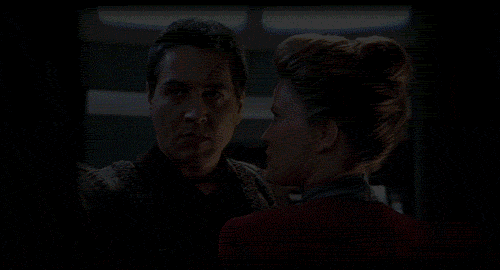
There was a bright light in her face and it was causing her head to throb. Slowly Sarah Barrett opened her eyes to take in her surroundings; the drab ceiling in sickbay greeted her. Sitting up slightly she saw that she was back on the ship, in the very same position she remembered being in before she had been taken to the array. She wondered how long they had been over there.
Sitting up, she felt a wave of nausea come over her. Groaning a little she thought I feel like I have a hang over. She caught movement out of the corner of her eye.
Tom Paris was nervously glancing around the cabin. Harry Kim was not where Tom had last seen him on Voyager; in sickbay. Every last member of the crew he could recall being there at the time of their abduction was there, except Harry. A pit the size of a boulder began to form in his stomach. Could Harry have died over there on that array? It was entirely possible that whatever the aliens had done to them had ended up killing some of the crew. Tom prayed that his negative line of thinking was proven wrong, but how else could he explain why everyone was put back in the place that they were last seen and Harry Kim had not? Tom dreaded that he had lost his only friend on this trip before he really got to know him.
"Senior officers report to the bridge," the Captain's voice came over the comm. line, cutting through his thoughts.
Tom noticed Sarah jump down from her biobed looking like she was about to throw up everywhere. Come to think of it, he thought, I feel the same way.
"Excuse me, could someone explain what has transpired," the EMH was demanding to know from Paris. "People don't disappear for three days without something happening."
"Three days?" Sarah gasped. "We were gone for three days?"
"Yes, and you're all in perfect health, at least from the people I scanned here," the Doctor replied.
Paris moved about the room anxiously. "Computer, locate Ensign Kim," he said, ignoring the Doctor completely.
"Ensign Kim is not onboard."
Paris and Barrett exchanged worried glances before quickly leaving sickbay behind them. Paris tapped his combadge. "Paris to Janeway. Kim didn't come back. He must still be over there."
The two entered a turbo lift and Sarah ordered it to take them to the bridge. Tom fidgeted with his hands the whole way. She bit her lip for a moment, knowing that this was probably a time where she put the explorer, researcher away, and took out the counselor. Harry had been the only one as far as she was aware that had not judged Tom by his past actions. "Tom, we'll find him," she whispered as the lift came to a stop.
He glanced at her as the doors hissed open and a soft look came over his eyes. Stepping out of the turbo lift they could see that Janeway was communicating with the Maquis. Tom felt his blood go cold at the sight of Commander Chakotay. It was no secret what the former Starfleet officer and Maquis leader thought of him, at the present time Chakotay couldn't see Paris on the viewscreen.
"Commander," Janeway could be heard saying as Barrett and Paris made their way down to the command station, "you and I have the same problem. I think it makes sense to try and solve it together, don't you?"
Solve it together? Paris thought with a flurry of panic. Chakotay would throttle him before joining Janeway, especially when he learned that Paris was hired to help find him.
Chakotay looked at the Vulcan sitting next to him. The Vulcan nodded his head as if to say that it was a good idea. He looked back at Janeway. "Three of us will transport to your ship." The transmission ended and she was looking at the Maquis ship again.
"They're powering down their engines and dropping their shields," Rollins announced as Paris and Barrett came to stand behind Janeway. She glanced over her shoulder at the former Starfleet pilot and her ship's counselor as the sound of a transporter etched its way into her mind. She turned and watched as three men materialized before here, wearing different forms of civilian clothing. They had their weapons cocked and ready to use in case of ambush. The Maquis weren't known for their trustworthiness.
"Watch out Captain, they're armed," she heard someone say. She put her hand up and turned to Rollins.
"Put down your weapons," she assured him. She turned to Chakotay and his men. "You won't need those here," she told him, gently. The three Maquis hastily lowered their weapons. Janeway stepped forward looking at the Vulcan. "It's good to have you back Mister Tuvok."
Chakotay and the other man looked at him confused. "I must inform you, that I was assigned to infiltrate your crew sir. I am Captain Janeway's chief of security." The other man made a move to strike at him, but Chakotay threw his arm out and stopped him.
"Were you going to deliver us into their waiting hands, Vulcan?" Chakotay asked, bitterly.
"My mission was to accumulate information on Maquis activities. And then deliver you into their 'waiting hands' that is correct," Tuvok answered.
It was then that Chakotay noticed Paris standing near the tactical station. "I see that you had help," he spat. Janeway and Tuvok turned to see that he was referring to Paris.
Paris stepped forward. "It's good to see you too Chakotay," he greeted, coldly.
Chakotay's eyes filled with rage, a rage that was raw and terrifying. "At least the Vulcan was doing his duty as a Starfleet officer. But you, you betrayed us for what? Freedom from prison? Latinum?" He shouted his voice getting hotter. "What was your price this time?" Chakotay yelled, moving towards Paris. Barrett grabbed a hold of Tom's arm, gently pulling him away. For a brief second their eyes met and there wasn't hostility from her swimming in her sapphire orbs.
Janeway stepped between the two men. "You are speaking to a member of my crew," she snapped. "I expect you to treat him with the same respect as you would have me treat a member of yours." She glared at him for a few seconds, a look that her children and former members of her crew knew all too well. Chakotay eventually backed down and turned away from her and Paris. "Now," Janeway stated, "We have a lot to accomplish and I suggest that we all concentrate on finding our people and getting ourselves home."
"Based on my initial reconnaissance Captain, I am convinced that we are dealing with a single entity in the array," Tuvok announced. He looked about the room at the gathering of Maquis and Starfleet officers.
"You thought the same thing too," Janeway said to Sarah.
The young woman nodded her head. "Yes ma'am. I'm not sure why the life form chose a Midwestern farm to transport us too, perhaps to make us feel comfortable, before getting to what they really wanted from us."
"I would suggest that he scanned our computers in order to find a comfortable holographic environment. In affect a waiting room, to pacify us until biometric assessment," Tuvok concurred.
"An examination," Paris questioned, hotly. If they had wanted the biology of human beings, then they could have just asked them for the data on it, instead of putting them through a painful experience.
"It is the most logical explanation," Tuvok replied, wondering who the newcomer was. "Why else would he have released us unharmed?"
"Not all of us were," Tom snapped, thinking of Harry.
Janeway looked at the floor for a moment, trying to decide what to do next. She looked up at Tuvok after several seconds of thinking. "Break out the compression phaser rifles. Meet us in transporter room two." She looked to her side at Chakotay, who had not said a word in several minutes. "We're going back,"she said, he looked almost shocked by that comment.
"We'll divide into teams," she announced, looking back at Tuvok. "Mister Tuvok, your job is to find out as much about this array as you can. It brought us here; we have to assume it can send us home. Miss Barrett, I'm going to need your psychological expertise when dealing with this…entity. I'm not sure what we're going to find over there and I'd like to do first contact the right way this time."
Barrett nodded her head. She felt anticipation rising, it had been a long time before she had dealt with a new species. Her time on the Explorer had solely dealt with the Borg.
Janeway was looking about the group pensively. "Do you agree with the plan?" she finally asked Chakotay. He gave her a curt nod. Janeway took the lead, and the Maquis, Tuvok, Barrett, and Janeway began to leave the bridge, while Paris contemplated his next course of action. He heard the Captain giving tactical orders and then she addressed Rollins. "Mister Rollins, the bridge is yours."
Paris realized he had two options,while the group of officers and Maquis moved off the bridge, stay behind and sit with Rollins and do nothing, or go and help the only friend that he had on this ship. The decision, in the end was a simple one.
"Captain!" He called, moving to catch up with the group just as Janeway was about to step into the turbo lift with the others. She stopped and went to meet him. "I'd like to go with you."
She sighed. "If this has anything to do with what Chakotay said…."
"It doesn't!" he snapped, she looked at him sternly. "I just…I'd hate to see anything happen to Harry."
Understanding that he wanted to help a friend, Janeway agreed, "Come on," she told him and the two made their way into the turbo lift hoping that their next trip to the Array meant getting their missing people back.
The farm was back. However this time there were not as many people around to greet them and ask them if they wanted any corn. Paris found this unnerving and relieving all at the same time. He patrolled the area with Janeway, Barrett, and Chakotay, looking for Harry and Chakotay's missing Engineer but so far they had found nothing.
The group made their way around the farm, Paris clutching tightly to a compression rife. As they rounded the farm, they met up with Tuvok and Michael Ayala, one of Chakotay's men.
Tuvok had his tricorder out. "There are no humanoid life forms indicated Captain. Kim and Torres are not within tricorder range."
Kathryn looked down at the ground. This mission kept getting worse and worse. First they were flung seventy thousand light years from home, then they were taken from their ship, examined by an alien being, and now Tuvok was telling her that two people had just basically vanished into thin air. Where could the array possibly have taken Kim and Torres?
"They may not be on the array," Tuvok finished.
"This may have been what they wanted all along, Captain," Barrett said.
Janeway knew that it was a real possibility, yet she was hoping for the best. She was hoping that they were going to find some clues as to where Kim and Torres where on this array.
"He can tell us where they are," Chakotay said before Janeway could respond, pointing towards the old man, playing a banjo on a bench in the middle of the farm yard. He broke away from the group and started for the man.
Paris, Barrett, and Janeway followed. "Maintain your comm. link," the Captain told Tuvok. "I don't want to lose anyone else!"
Tuvok and Ayala took off in the opposite direction.
When Chakotay, Janeway, Barrett, and Paris stepped up to the old man he opened his eyes and looked up at them. With a disgusted look he said, "Oh why have you come back, you don't have what I need."
"I don't know what you need, and frankly I don't care," Janeway snapped. She was tired, seventy thousand light years from home, had a missing crewman, and her baby had an ear infection; in short she was a woman who had a short fuse at the moment. "I just want our people back and I want us all to be sent home!"
The old man chuckled at her. "Oh, aren't you contentious for a minor bi-pedal species?"
Janeway placed her hands on her hips and glared at him, a look that Bryan had always joked was her "command" glare. "This minor bi-pedal species doesn't take kindly to being abducted," the Captain snapped.
The old man waved a hand at her in contempt. "It was necessary."
Chakotay sat down on the bench across from the old man. "Where are our people?" he asked, softly, hoping that the passive tones would do more on the man than the more aggressive tones of Janeway.
"They are no longer here."
"What have you done to them?" Janeway inquired.
The old man looked at Chakotay. "You don't have what I need," he said, and then pointing at Chakotay, he whispered, "They might. No, you have to leave them."
"We won't do that," Chakotay replied.
"We are their commanding officers," Janeway said. "We are entrusted with their safety. They are our responsibility; that maybe a concept that you don't understand."
The old man looked at her with understanding. "Oh no, I do understand. But I have no choice," he sighed, sadly, tears beginning to appear in his old eyes. "There just is not enough time left!"
"Left for what?" Janeway asked.
"I must honor a debt that can never be repaid," the old man answered.
Janeway and Barrett exchanged glances before Janeway went to sit on the bench next to the old man.
"But my search has not been going well," the old man continued, staring into the distance.
"Tells us what your looking for, maybe we can help you find it," Janeway offered.
"You," the man laughed. "I've searched the galaxy with methods beyond your comprehension. No, there's nothing you can do."
Janeway felt her frustration growing and she made eye contact with Chakotay. "You've taken us seventy thousand light years from our home. We have no way back unless you send us and we won't leave without our people."
"But sending you back is terribly complicated," the old man argued. "I don't have time! NOT ENOUGH TIME!" He waved his hand about angrily and the group before him disappeared in a golden flash. On the bridge of Voyager, the entire away team appeared with a flash of bright light to the puzzlement of the bridge crew.
Janeway went to lean on the rail near Conn, peering at the view screen and the pulses emitting from the massive array. Where could those pulses possibly lead? Out of the corner of her eye she noticed that the Maquis were leaving, probably to go back to their ship, and Tom was going to put the compression rifles away. Their foray over to the array had left her with more questions than answers. "Tuvok, Counselor, can I speak with you both in my ready room please?"
Straightening her form she made her way down the steps and into the private room. Tuvok and Barrett followed behind her and she didn't address them until she heard the door hiss shut behind the young woman. "First things first, we need to establish a little chain of command here."
Barrett raised an eyebrow. "Ma'am?"
"I've lost my first officer, my chief medical officer, my chief helmsmen, and my chief engineer, not to mention my chief operations officer is missing, I'd say that my senior staff is pretty dwindled, wouldn't you agree, Counselor?" Janeway inquired, rhetorically. "Until we get home…if we ever do, I'm afraid that you and Tuvok are the only senior officers I have. Now, normally a ship's counselor wouldn't be called upon to command, but under the current circumstances, you may have to. Tuvok, until further notice you're acting as my first officer."
"Understood Captain," the Vulcan answered emotionlessly.
Janeway rubbed her temples for a moment; she could feel a stress headache forming. "I want you to find out where those pulses are going, Tuvok. Maybe the array used them some how to transport Kim and Torres. Sarah, I want you to coordinate repair efforts; all acting senior staff will report to you."
Barrett nodded her head, not sure why Janeway had put her in that position. "Shouldn't they be reporting to Tuvok?"
"I need Tuvok at Tactical," was Janeway's reply. She snapped her tired eyes up to the two officers. "You have your orders, I'll be in my quarters; you're dismissed." The Captain watched as Tuvok and Barrett left her ready room. When they were gone she exited the room herself using the port entrance and made her way to the turbo lift.
This wasn't how she had pictured her first mission as captain to go. She was always prepared for things to not go as planned, but this had blown way beyond that preparation.
Entering the access code to her quarters she just wanted to sit down with a good cup of coffee and mull over the next course of action. She wasn't going to get such a chance. Michael had tried to the best of his five year old abilities to feed Ava dinner and both children were covered in what Kathryn assumed was the baby's cereal. Ava was more interested in playing with the food than her brother feeding her.
Groaning inwardly, the cup of coffee pushed to the back of her mind, Kathryn stepped into the quarters.
"Hi Mama," Michael greeted her as Ava plopped a fistful of cereal in his hair. "Ava was hungry, so I fed her."
Kathryn plucked Ava out of the dining chair and tried to muster a smile for her son. "Thanks honey," she said, softly, wiping Ava's mouth with her bib. "Why don't you go start the bath water while I clean your sister up?"
Michael's response was to run into the bathroom. Kathryn soon heard the water as it started to fill the tub. Finishing up with cleaning Ava's goopy hands, she reached for the hypospray with the ear infection treatment. It had been three days since Ava had had it, since that had been how long they had spent on the array. Kathryn had checked on the children after she had woken up in Engineering and found them in one piece in their quarters. But she had been whisked away to the bridge before she could give the baby her medicine.
Ava squirmed slightly as her mother pressed the hypospray to her neck, whining so her mother would put her down. Kathryn obliged not in the mood to fight with her daughter. As she did so and Ava took off waddling to play with some toys, she heard something break in the bathroom and Michael call out a hasty apology.
Closing her eyes, she had one thought running through her mind, it's going to be a long night.
Harry awoke with the sound of energy pulses coursing through his brain. He was in a completely white, sterile room, and it certainly was not Voyager. He briefly recalled the array and what had happened there. For a moment he wondered if the others were all somewhere in rooms like this one, waking up groggy and confused as to what was going on.
A woman was looking at him now. Just looking at him, it was a little disconcerting. A man joined the woman now. He smiled softly at Harry. He wasn't sure if they were trying to communicate with them, believing that he was a telepath, or if they were just...staring at him.
Harry felt him self panic. "What am I doing here? Where am I?" he asked, sitting up.
The woman put her arm around him. "Please don't try to move yet," she spoke. "You're very ill."
"Ill?" Harry said, confused. He had not been sick when he left Deep Space Nine. "There's some mistake," he said, gazing at his hands. "I'm not ill." But even as the words left his lips he saw the sores and welts on his arms. They were huge and puss filled and looked like they were slowly spreading throughout his body. He opened the white shirt he was wearing to see another abrasion on his chest. His breathing quickened as he realized that something was wrong with him.
"No," a woman's voice shouted.
Harry glanced over his shoulder to see a Klingon woman jump off the cot next to his. Briefly their eyes met before she ran towards the door, pounding on it. The man went to stop her, but she fought him. Harry watched as the woman pressed a button near by the beds and as the man struggled with the Klingon. She hit him squarely in the mouth to get away from him and was back at the door trying to get out.
As she did the door slid open and another man and woman, their lower faces covered with a white material of some kind, entered the room, grabbing a hold of her. She struggled in their grasp, noticing the sores on her body for the first time, as the first man got up off the floor, nursing his mouth. He held a type of hypospray to her neck and she fell unconscious again.
The two aliens holding onto the Klingon woman brought her back to the empty cot and laid her down, leaving the room afterwards. Harry watched as the first man and woman tended to the Klingon, and then looked a way, a pit forming in his stomach. Was this how his first mission was going to end? By dying?
"Lieutenant Carey, can I speak to you for a moment please?" Sarah Barrett asked stepping into Main Engineering.
Joe Carey, temporarily in charge of the department looked up from his console with a flirty smile. Wonderful, Sarah thought as she moved towards the station, another Tom Paris. "Yes, ma'am, what can I do for you Counselor?" the engineer asked when she finally came to a stop at his station.
Sarah held the PADD she had in her hand up. "Care to explain why this status report hasn't been updated in nearly ten hours?"
"I've had nothing to update, ma'am."
"Nothing to update?"
Carey laughed nervously. "It's taking a lot longer to make repairs than I originally believed; nothing is done being repaired yet. I can assure you though Counselor that we're working around the clock to fix everything. None of my people have left yet and we're all pulling double shifts, some even are pulling triple shifts. It will get done, it's just going to take time."
Sarah tapped the PADD against her leg. "Time," she repeated. "Lieutenant Carey I don't know if you've looked around you lately but we don't have a lot of time. We're seventy thousand light years from with a missing crewman. Time, as you say, is not on our side. If Captain Janeway asked you to have the repairs to the warp engines made by a certain time you'd complete it by that time, would you not?"
"Well of course I would..."
"What bothers your more, Lieutenant? The fact that I'm a counselor or that fact that Janeway left me in charge of repairs?"
Carey looked increasingly uncomfortable. "Neither ma'am. I'll make sure the warp drive is back online by the morning. We'll double our efforts."
Sarah smiled sweetly. "Thank you," she said before turning on her heel and leaving. As she walked out she briefly became aware that people were looking at her with a little bit more respect, which wasn't the point of coming down, however, it was a nice added bonus as she made her way out of the room. It would perhaps make her job of over seeing the repairs a little easier.
#star trek voyager#star trek voyager fanfic#kathryn janeway#chakotay#tom paris#sarah barrett (oc)#harry kim#b'elanna torres#kes#neelix#the doctor (emh)#janeway x chakotay#tom paris x ofc
7 notes
·
View notes
Text
Star Trek Voyager: Bride of Chaotica

Episode 5.12 “Bride of Chaotica!”
Paris and Kim are playing Tom’s Captain Proton program on the holodeck when an anomaly appears and holodeck controls go offline. Voyager is trapped. Janeway tells a story about being a science officer on the Al-Batani, trying to force their way out of a nebula, so they decide to power down the warp core. Two aliens materialize on the holodeck and are taken prisoner by Chaotica. They say they wanted to contact other photonic lifeforms and learn from them. Chaotica kills one of them. Chaotica has a death ray. Voyager’s systems continue to go offline the longer they are stuck. They detect weapons fire on the holodeck, and Tom and Tuvok return to the holodeck to investigate. They run into Chaotica’s robot who tells them that invaders from the 5th dimension attacked them. Kim and Seven get a visual link to the holodeck where they see that Chaotica is fighting the aliens and calling for Arachnia’s help. Paris takes Tuvok to Proton’s ship. He gets sensor readings by “telegram.” When they are on the ship, one of the aliens arrives. Paris tells him there’s been a misunderstanding, and Tuvok tells him that they are in a simulation. The alien is not familiar with biochemical life forms and believes all life to be photonic. The alien tells them he does not believe they are real. Paris explains the situation to Janeway. Paris suggests that they help the aliens to defeat Chaotica, that he/Proton could destroy Chaotica’s death ray with his destructobeam if someone else can get inside the Fortress of Doom and shut down Chaotica’s lightning shield. He suggests that Arachnia is the one to do this. Paris explains that Chaotica is in love with Arachnia and has been trying to form an alliance with her. She’s the only one who can get close enough to disable the lightning shield. After much persuading from everyone, Janeway agrees. “I’m a size four,” she says. The Doctor takes on the role of President of Earth. Paris schools Janeway on the correct terminology — “ray gun, not phaser; imagizer, not view screen; Earthlings, not Terrans.” Paris tells Janeway if she has trouble, she can always uncork the pheromones. “I beg your pardon,” she says. He explains that the pheromones keep Chaotica under Arachnia’s spell. Janeway/Arachnia sits down in Chaotica’s throne and quips, “Somehow I feel comfortable here.” The Doctor arrives and speaks to one of the aliens. He tells the alien that they are allied against Chaotica, and that they need the aliens to stop firing their weapons. The alien agrees. Although at first Chaotica traps her, Janeway/Arachnia still manages to best him and disable the lightning shield. “I don’t know how to tell you this, but the wedding’s off,” she says. Paris destroys Chaotica’s death ray, and Voyager is able to escape.
Original Airdate: January 27, 1999
Production Number: 207
Meanwhile, back in the Alpha Quadrant...
Another Changeling arrives on the station. He makes Odo doubt his place among humans. Kira helps the Changeling escape and tells Odo to go meet him, because she truly loves him and wants him to be happy. She doesn’t want him to stay on the station because of some sense of obligation. Odo goes to meet the Changeling, but only to tell him he’s not going to go with him. Odo returns to Kira, and she assures him that she wants to know him the way he really is.
#star trek#star trek voyager#voyager#episode guides#chaotica#bride of chaotica#captain proton#arachnia#janeway#kathryn janeway#captain janeway#summary#kj115's episode guides#episode summary
4 notes
·
View notes